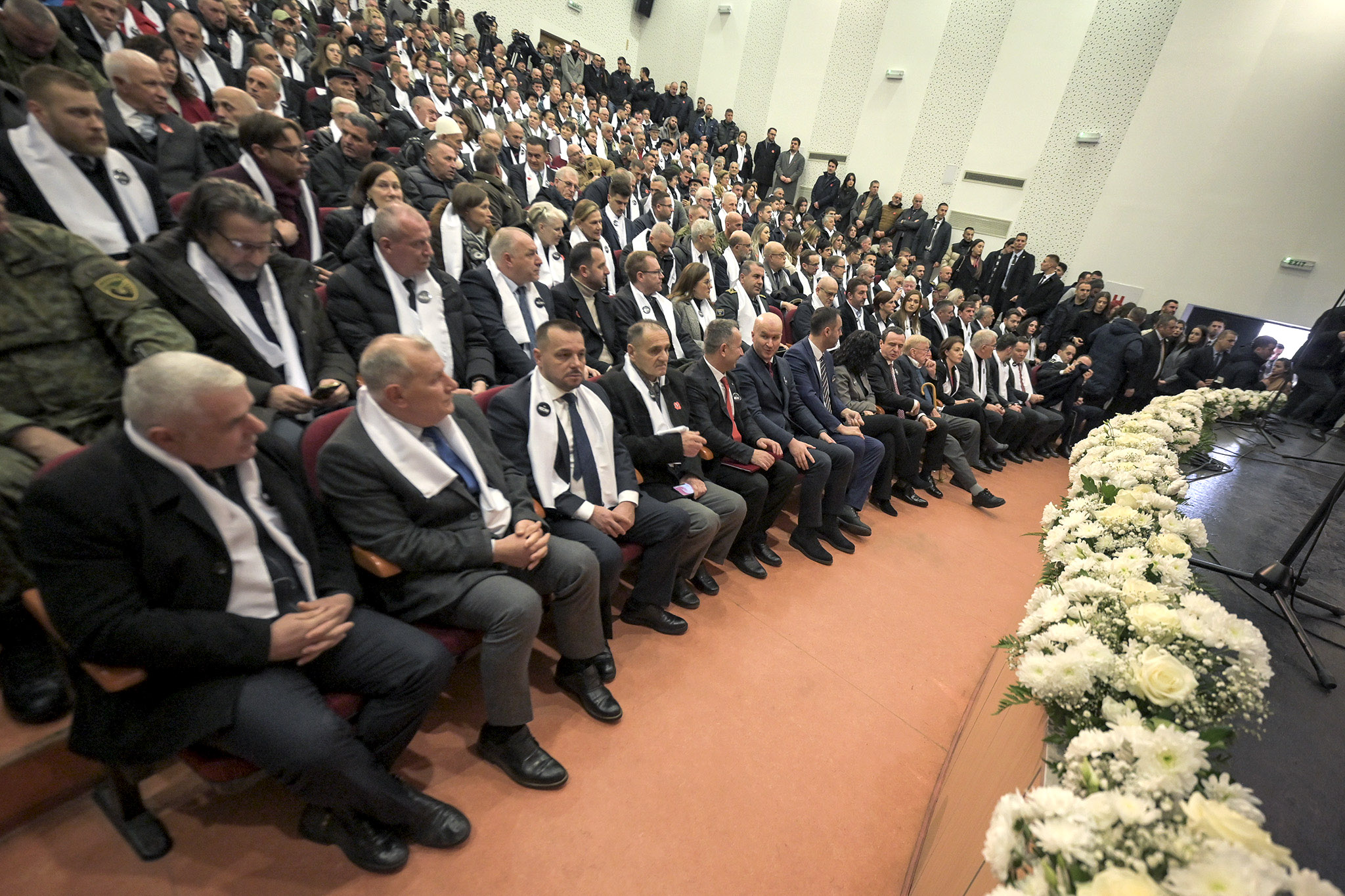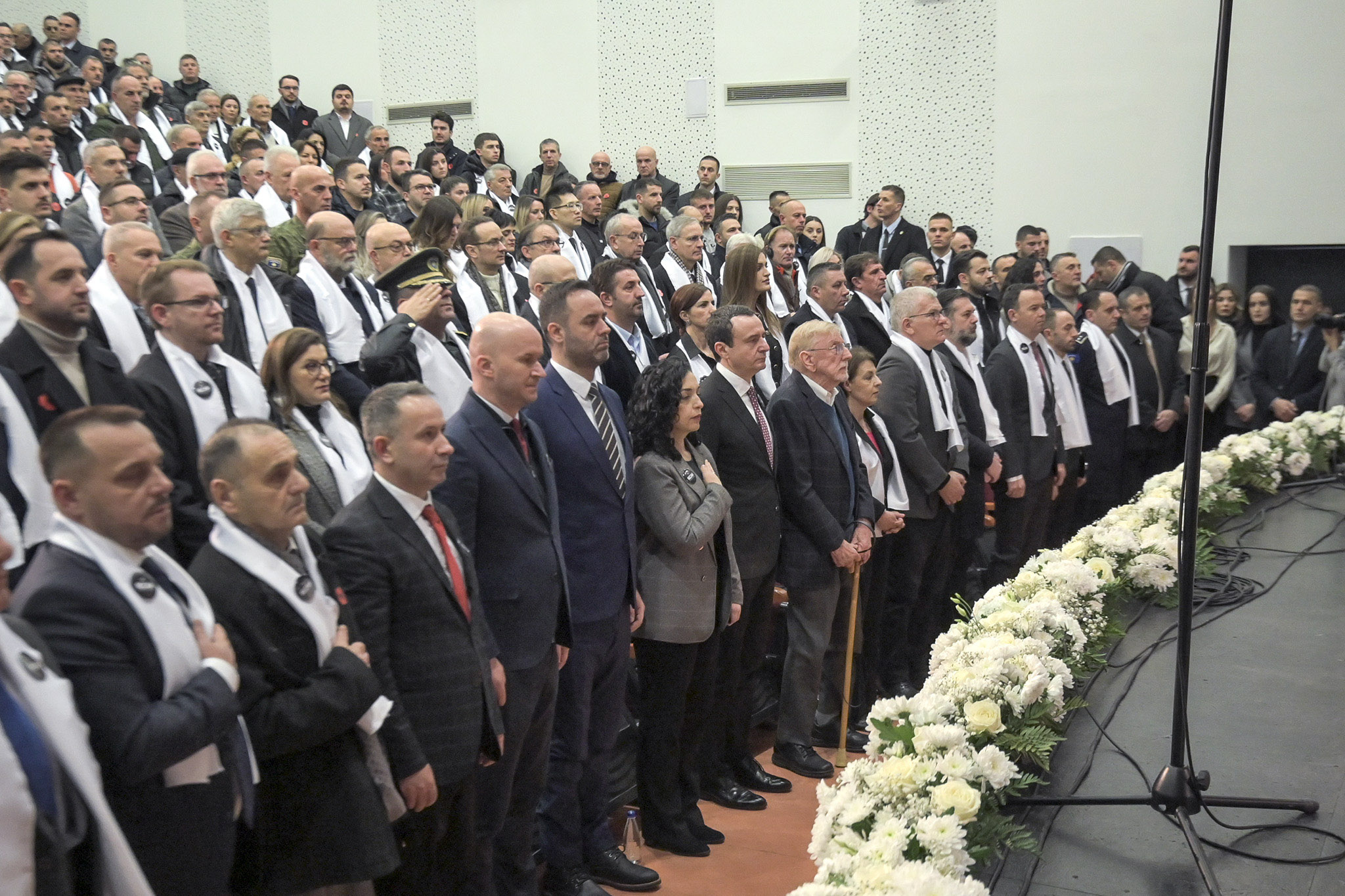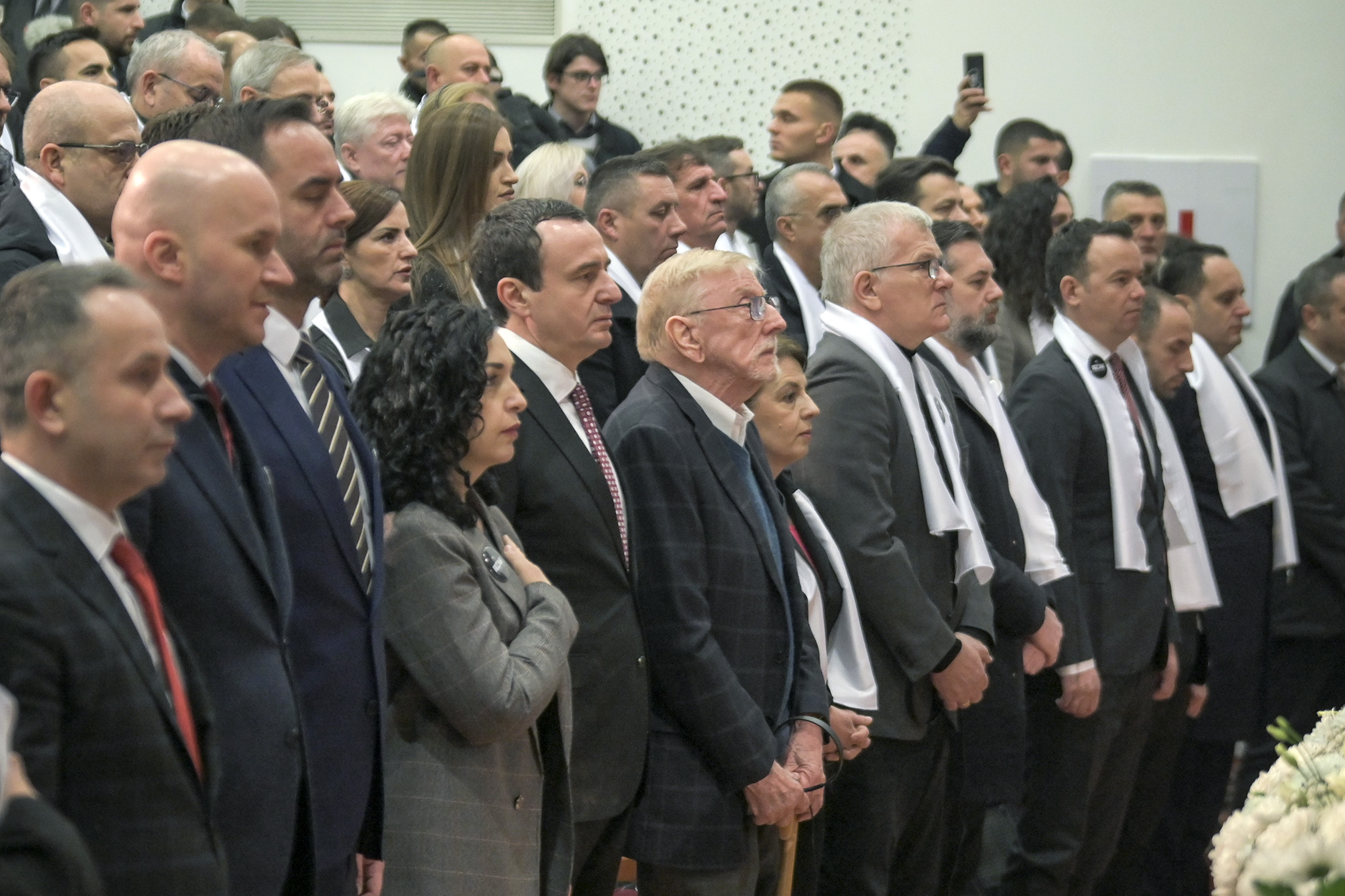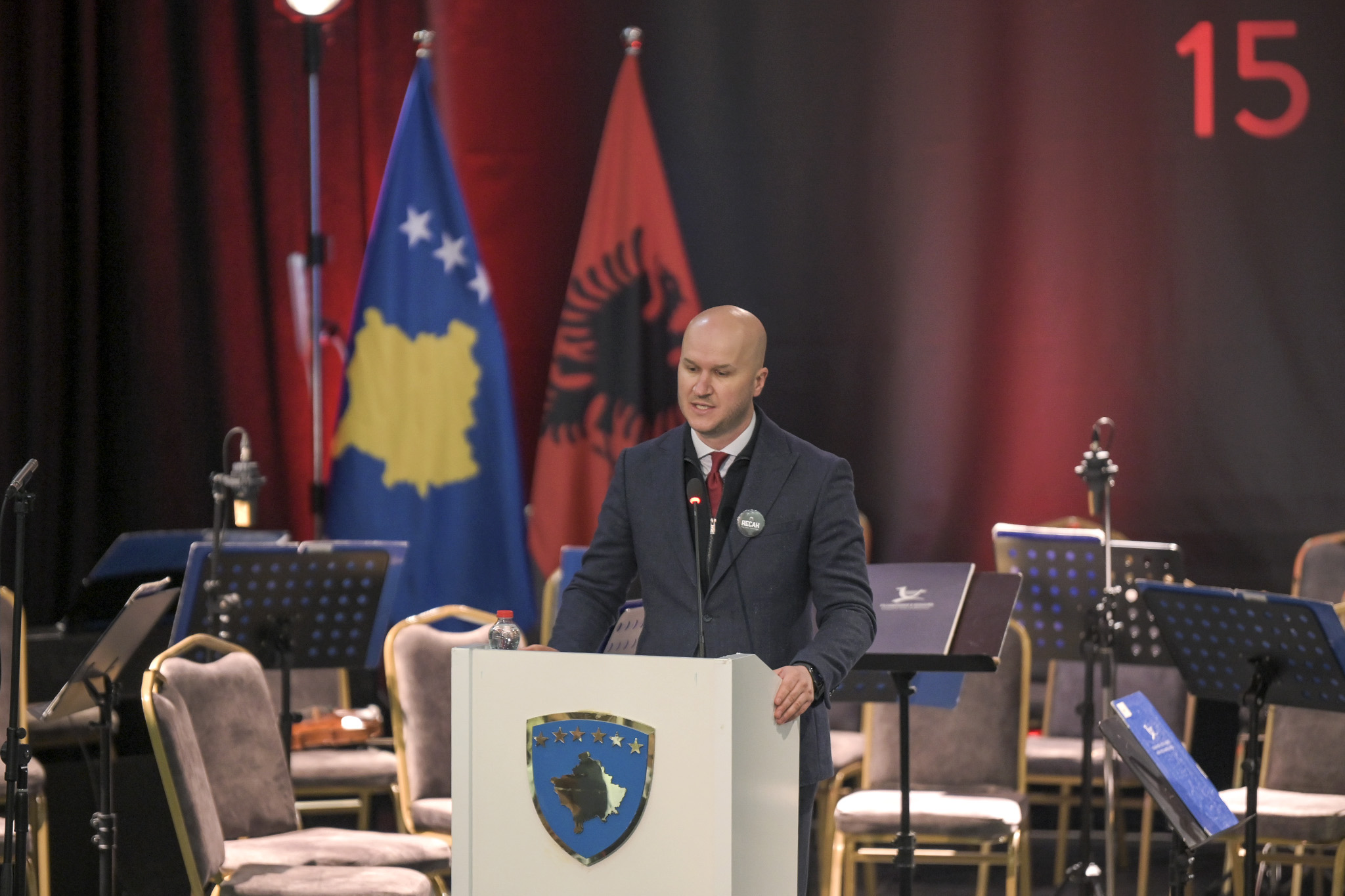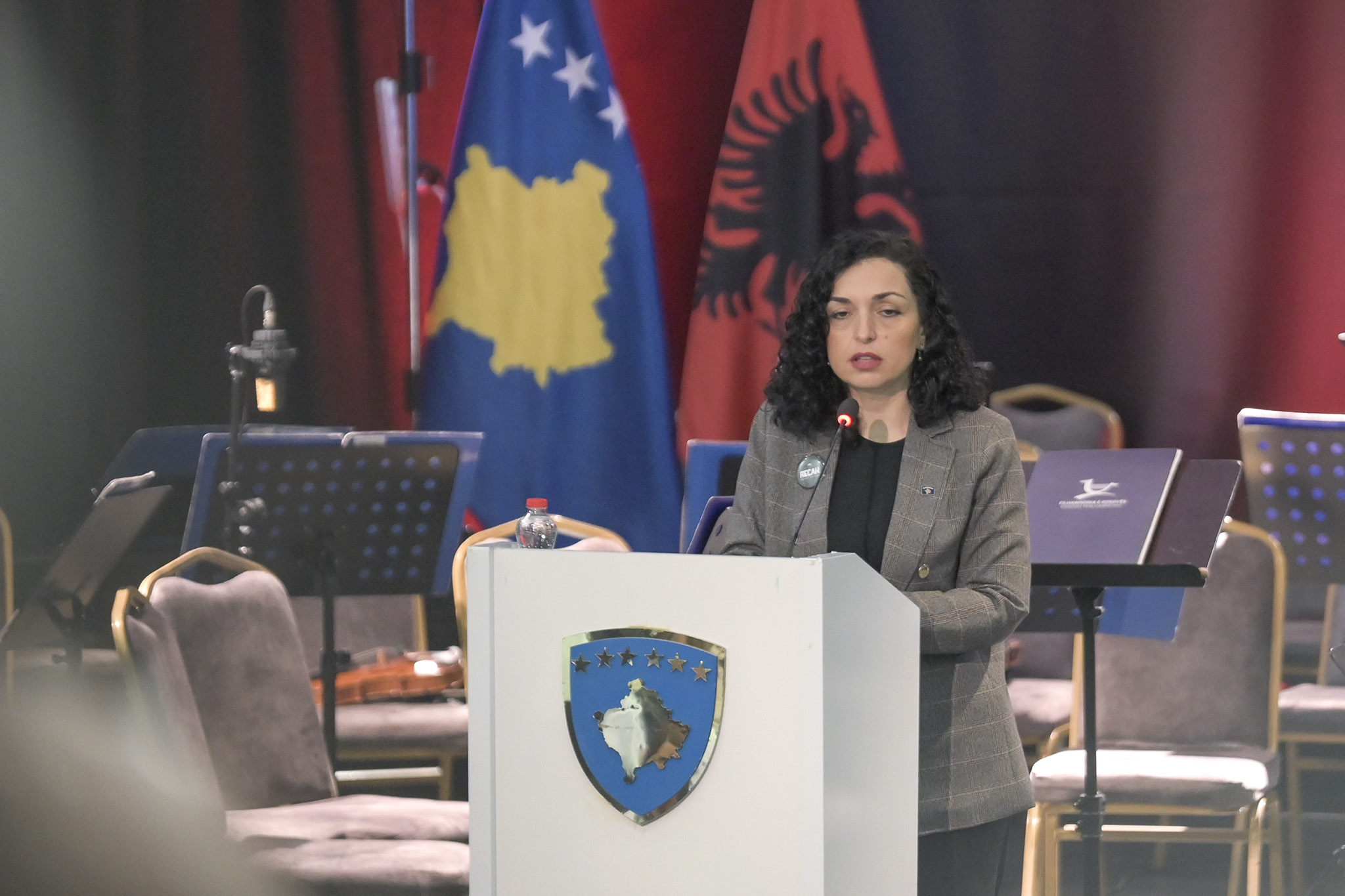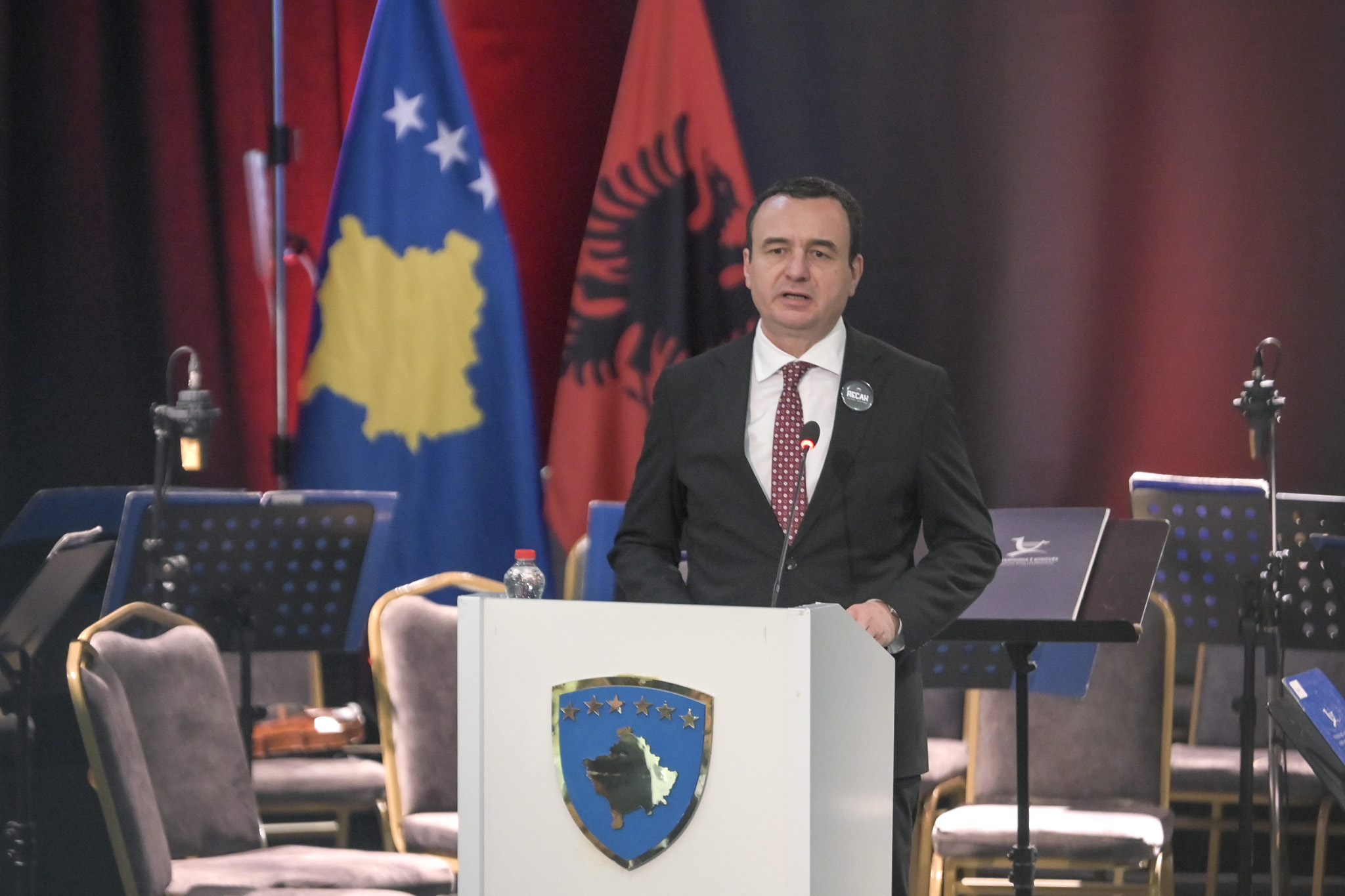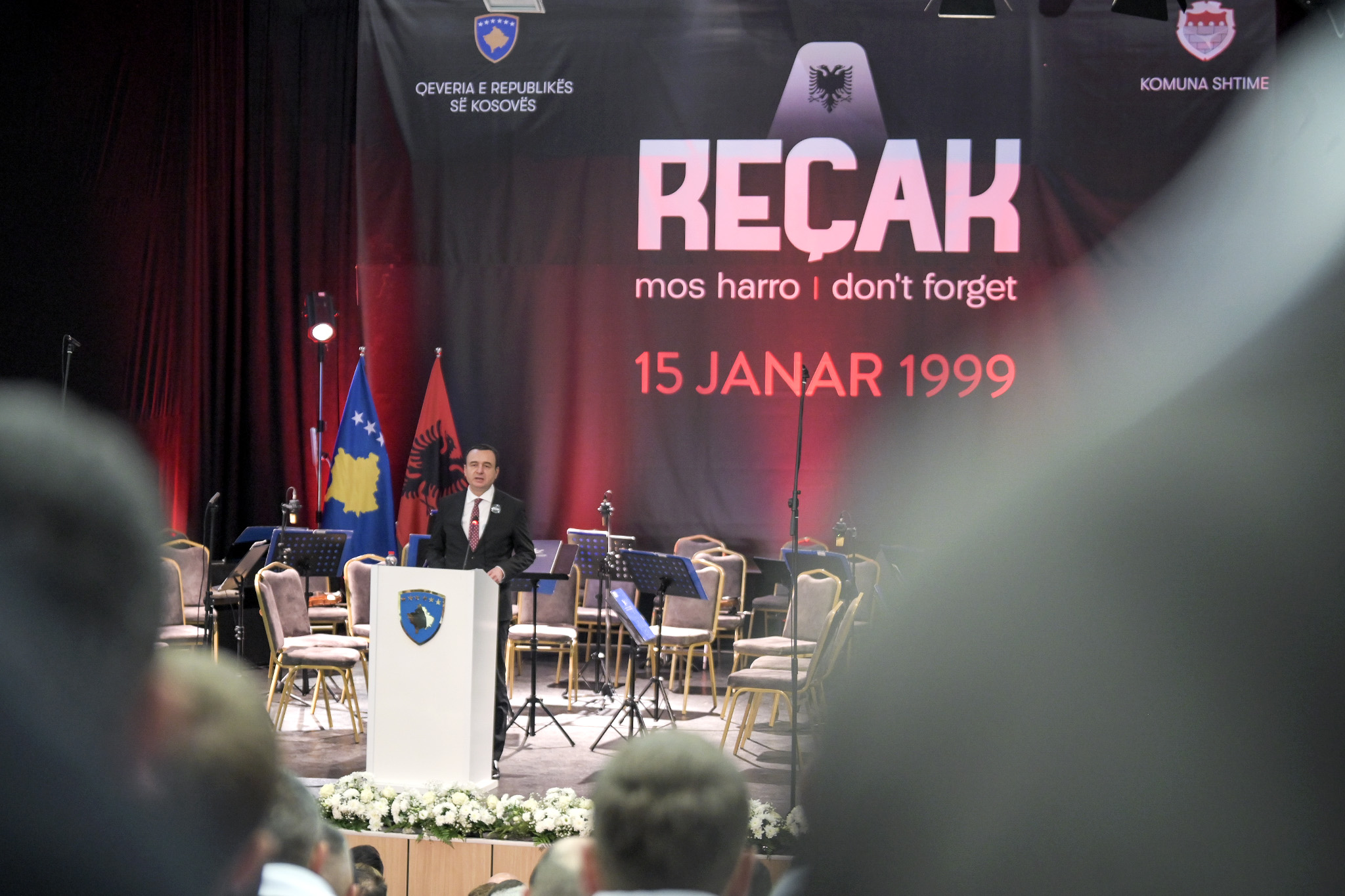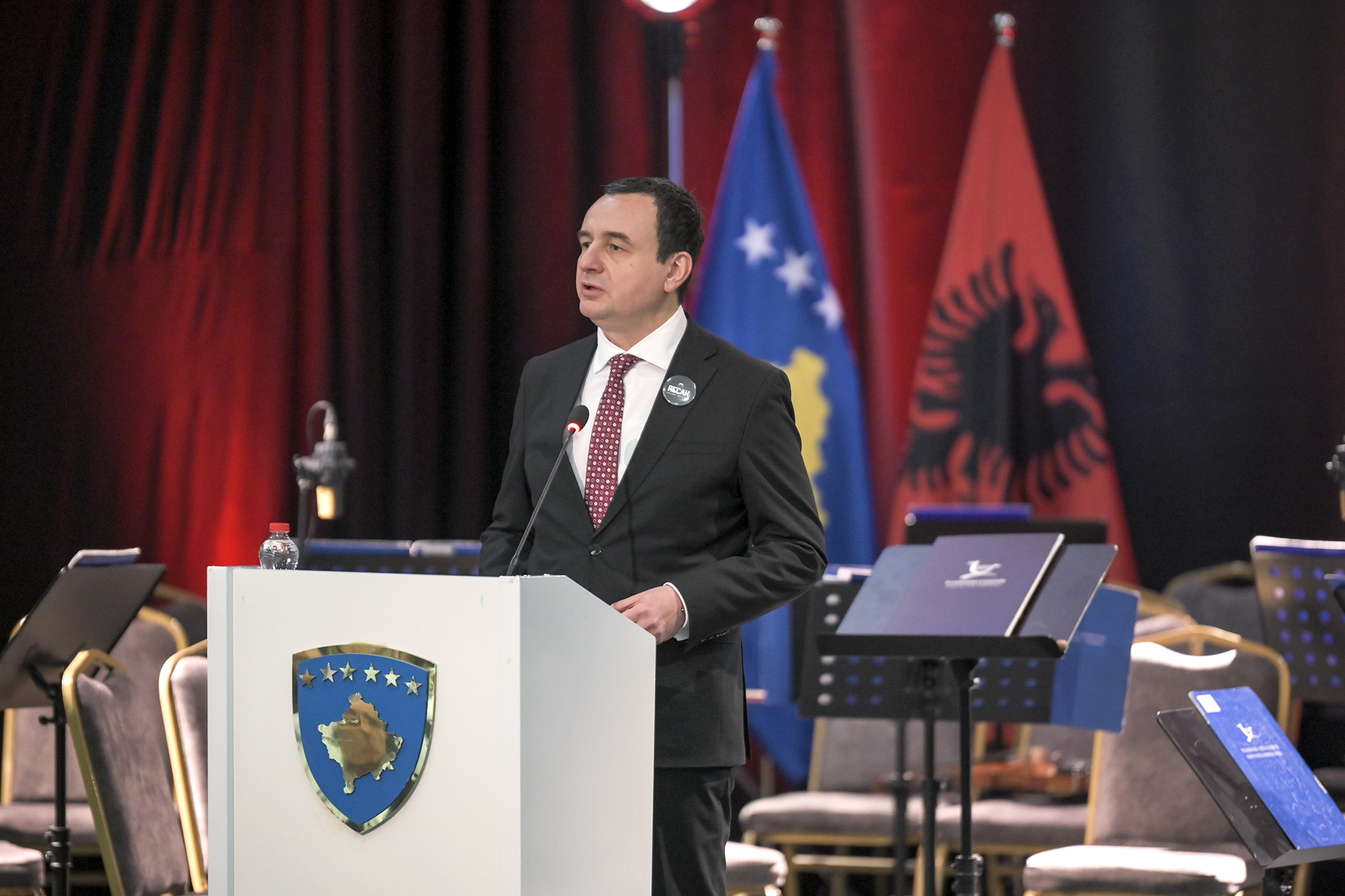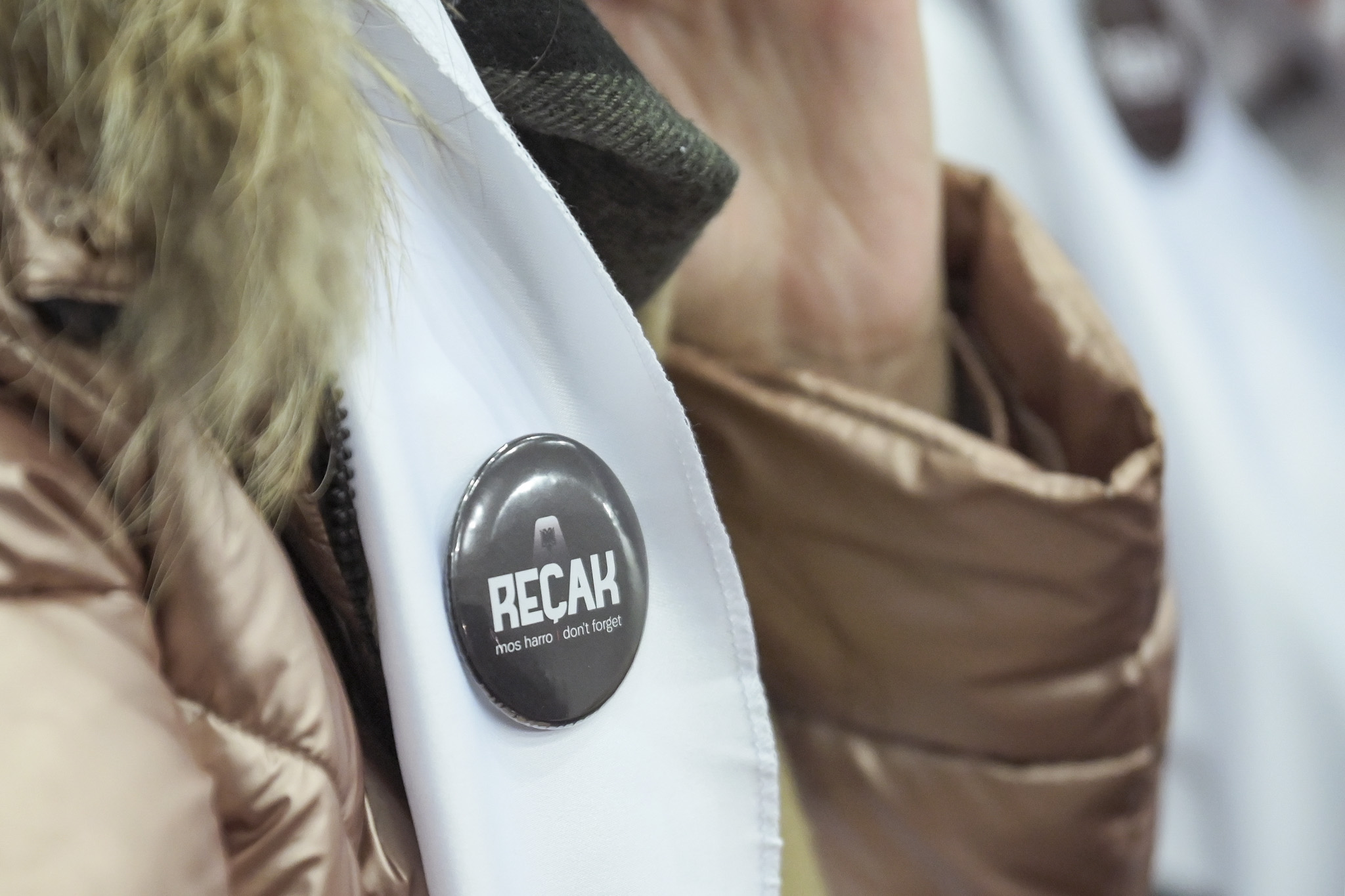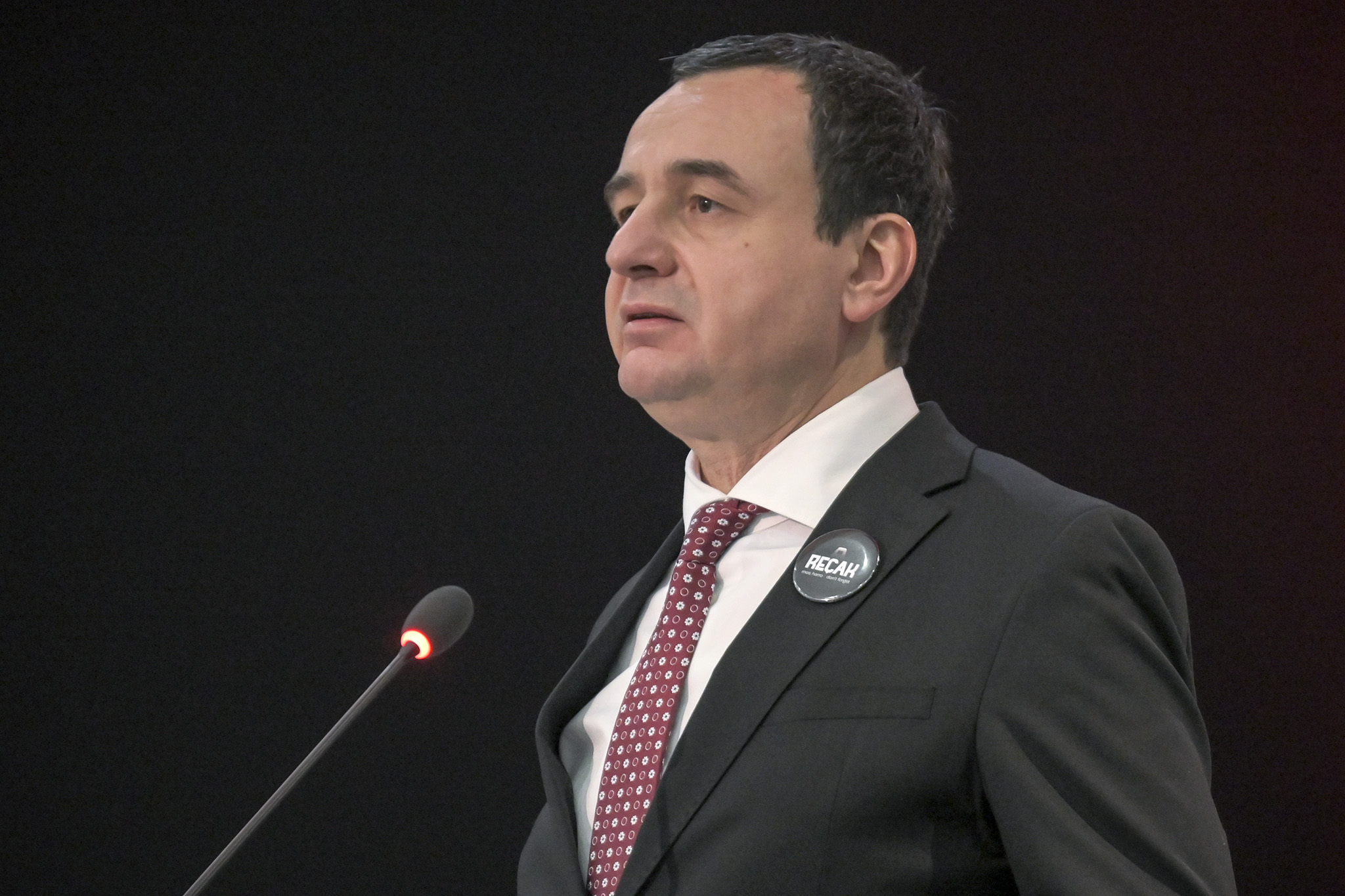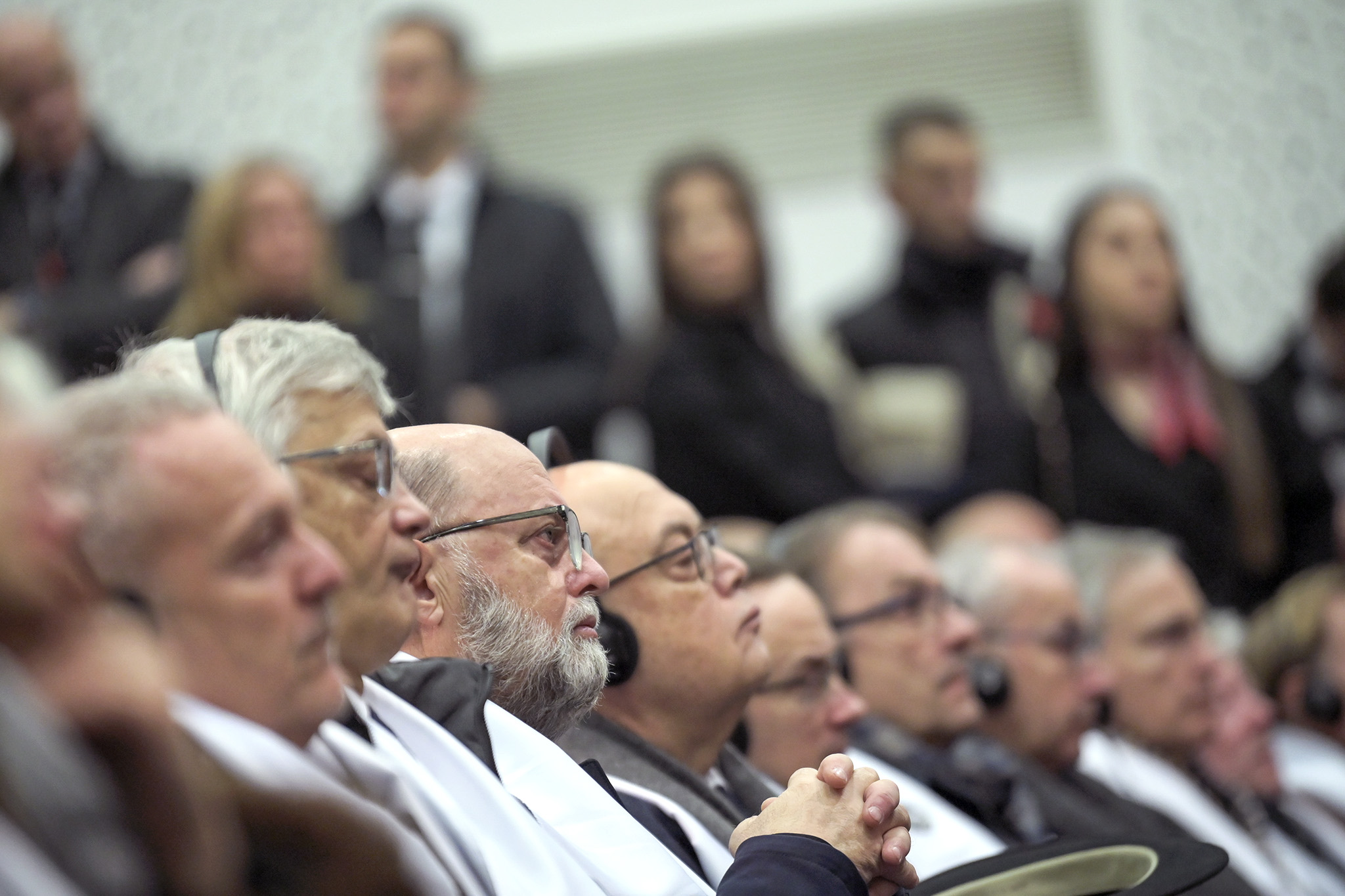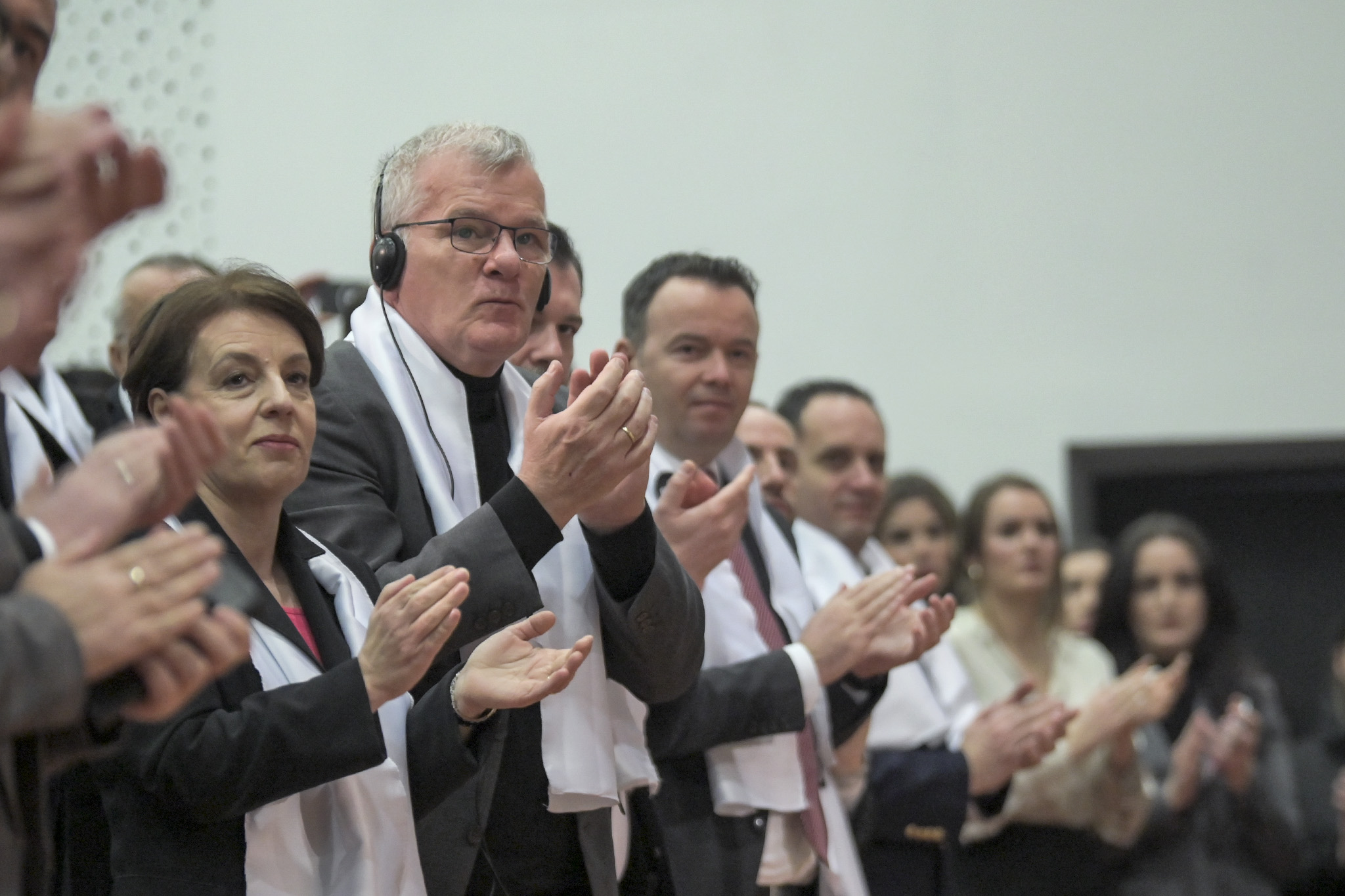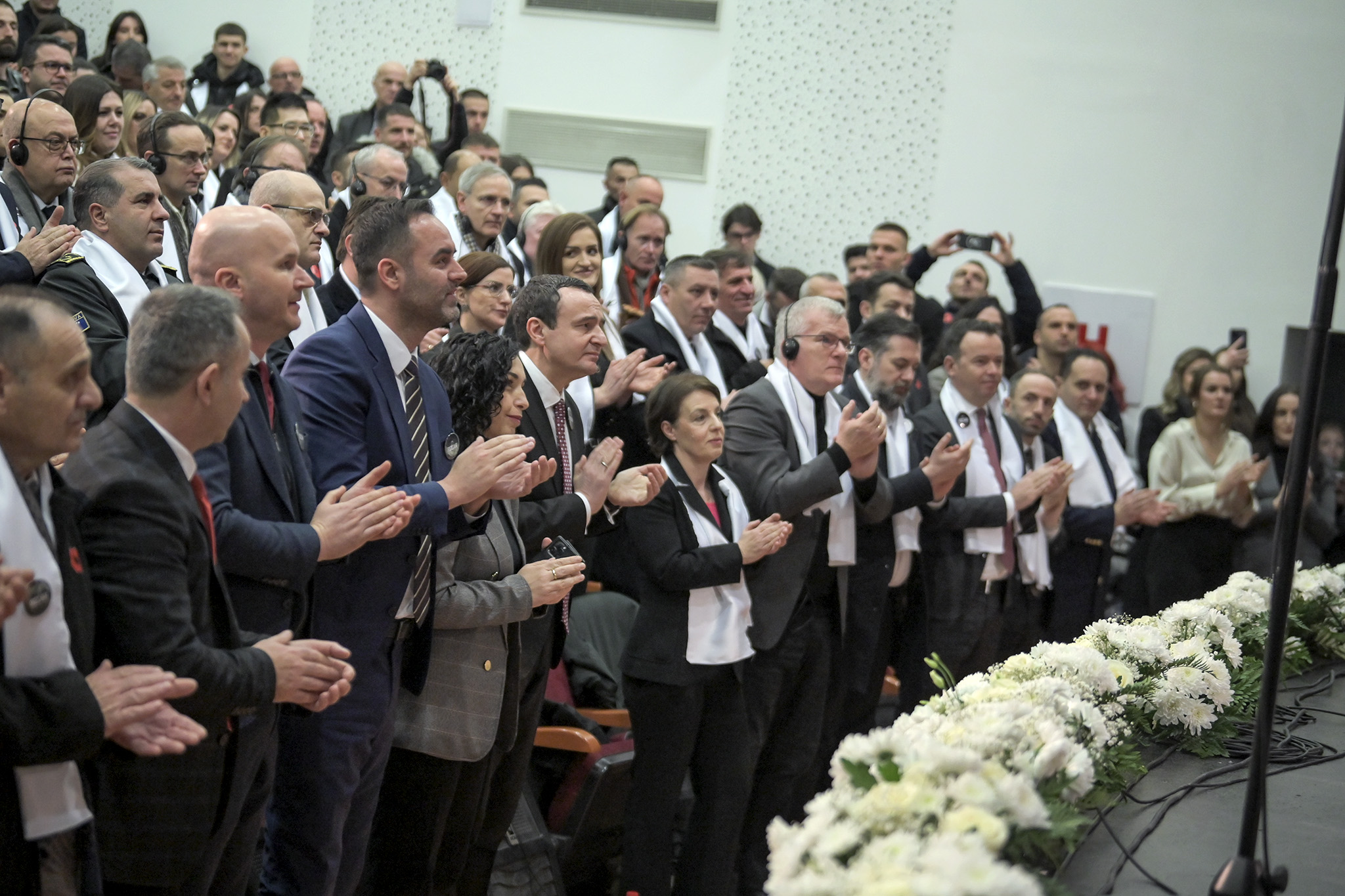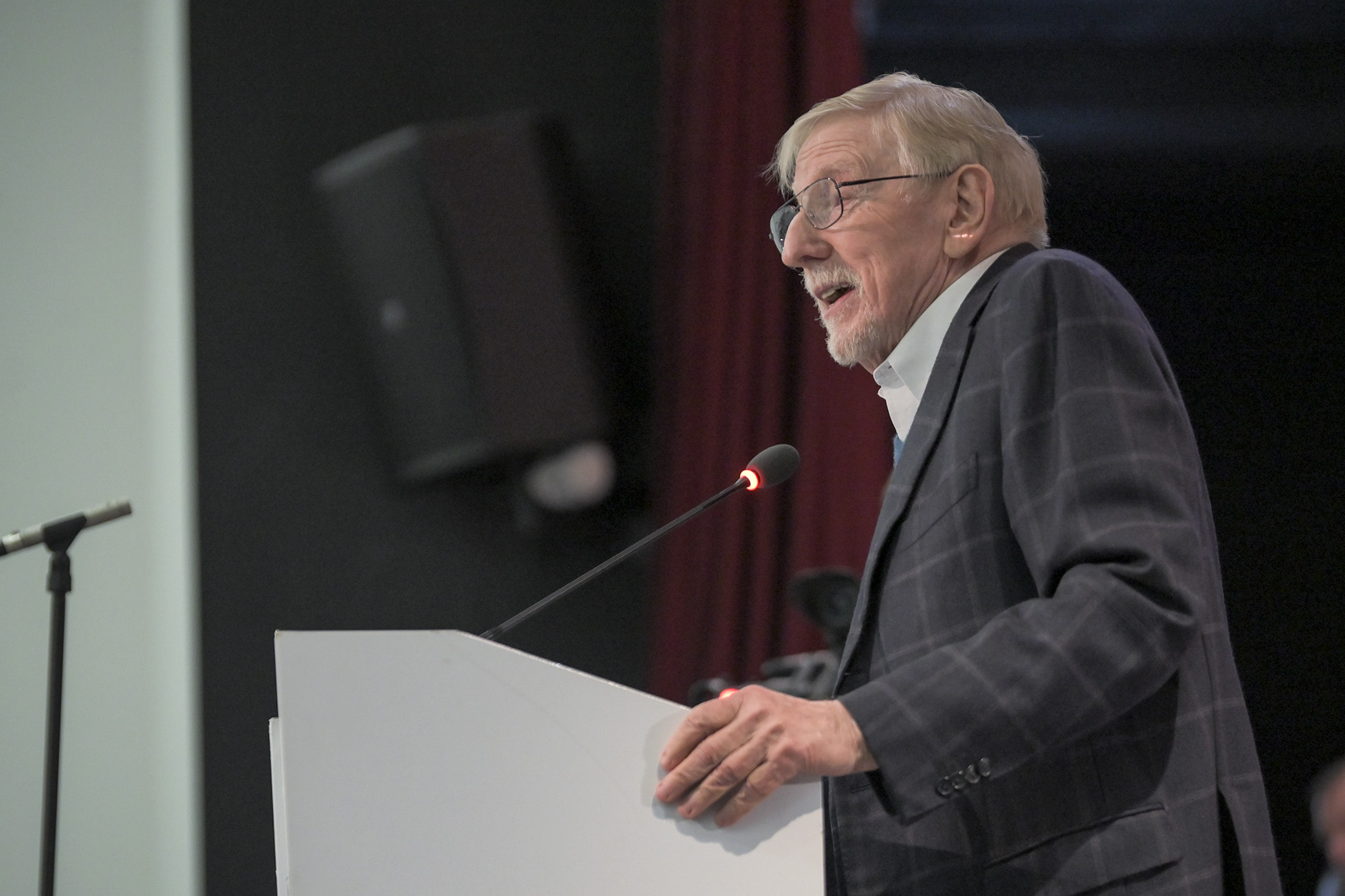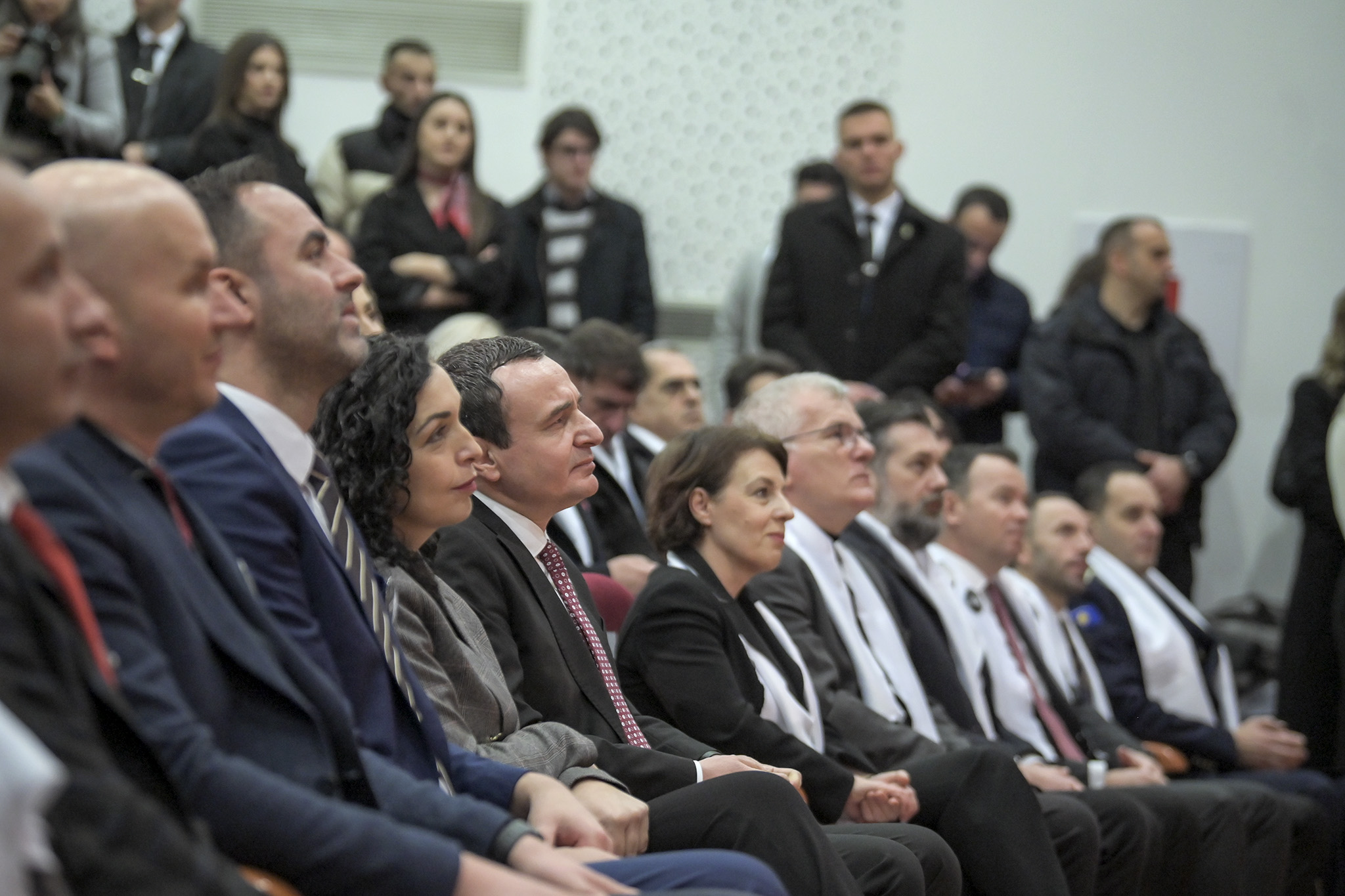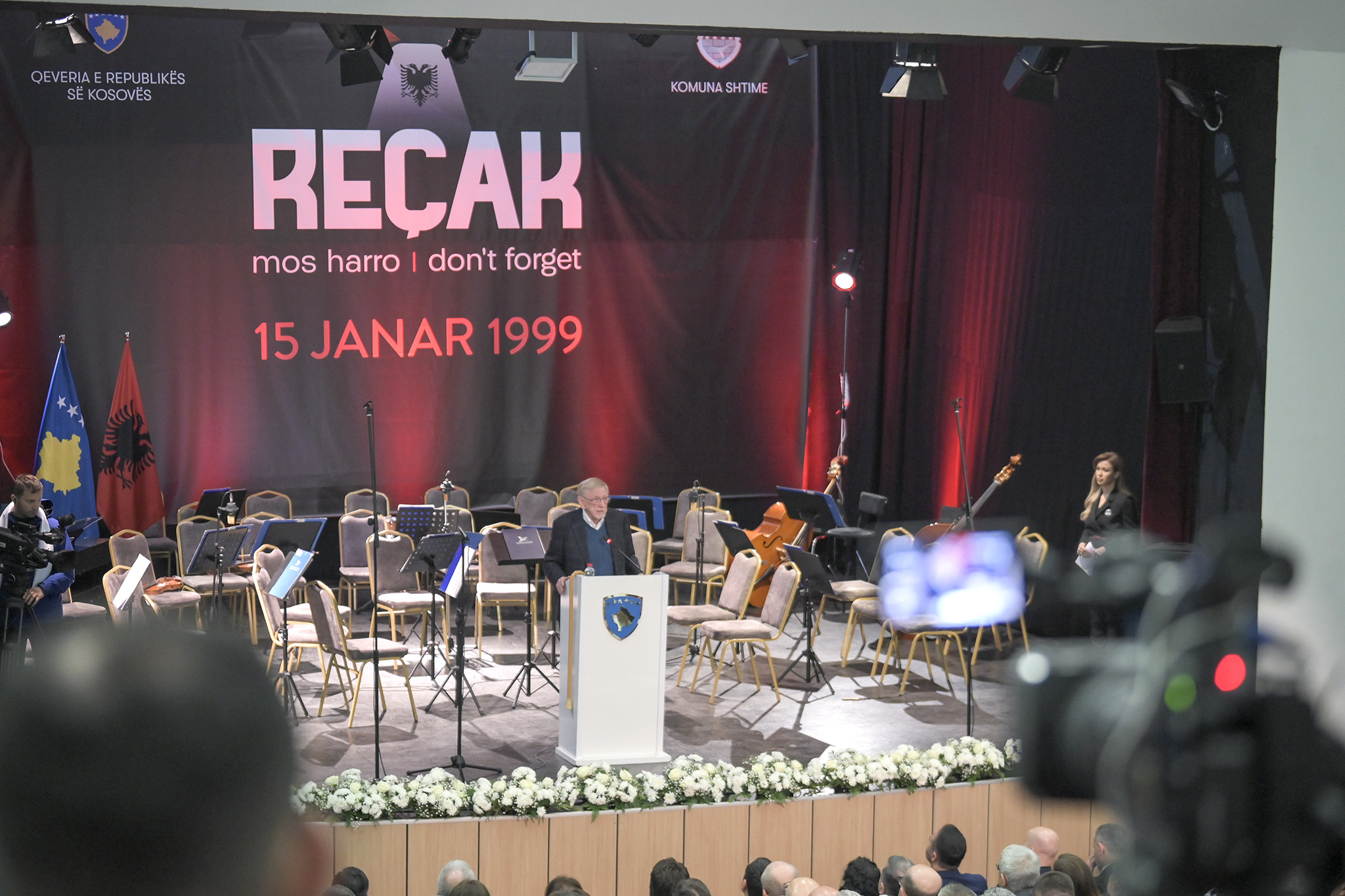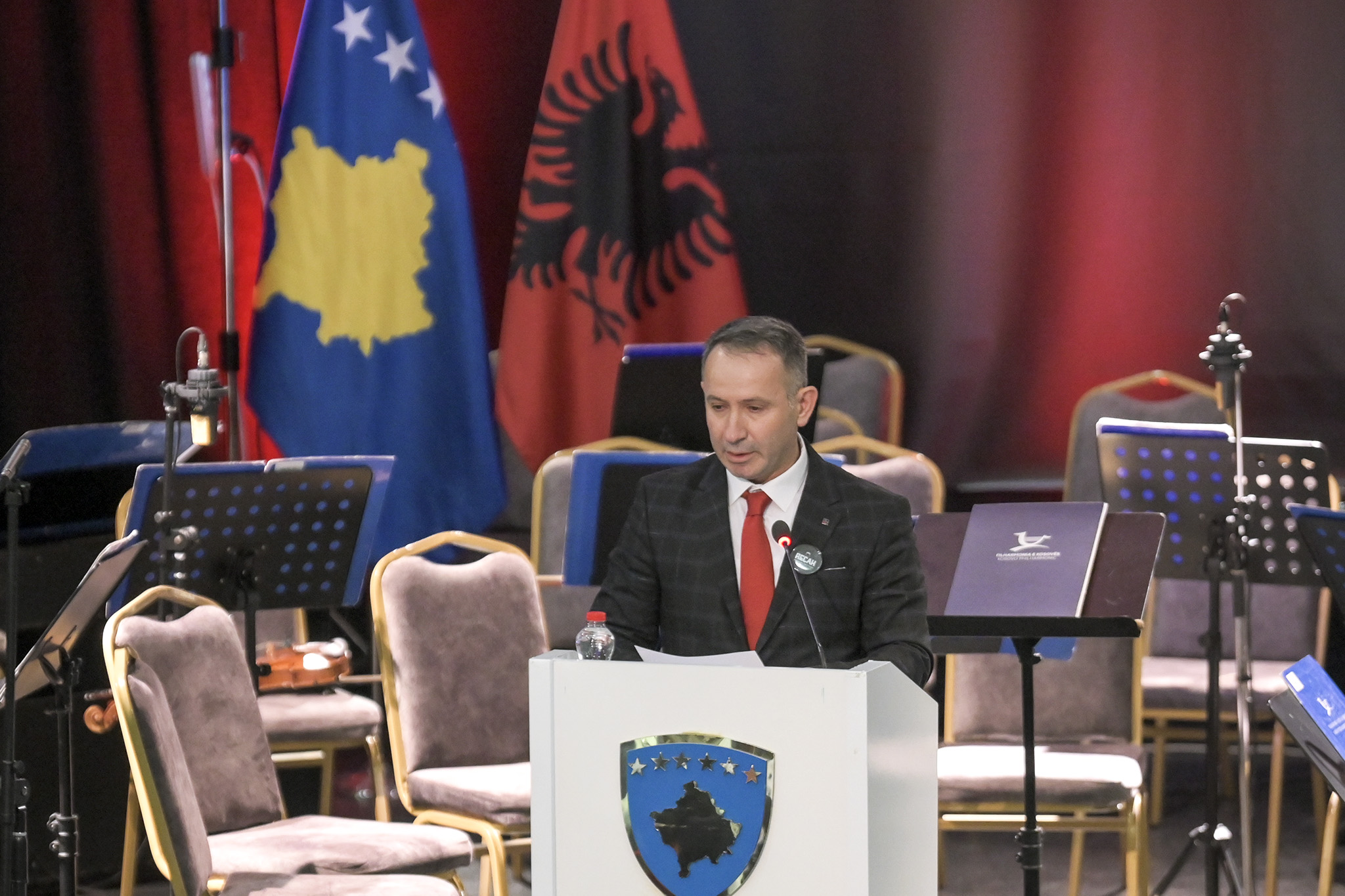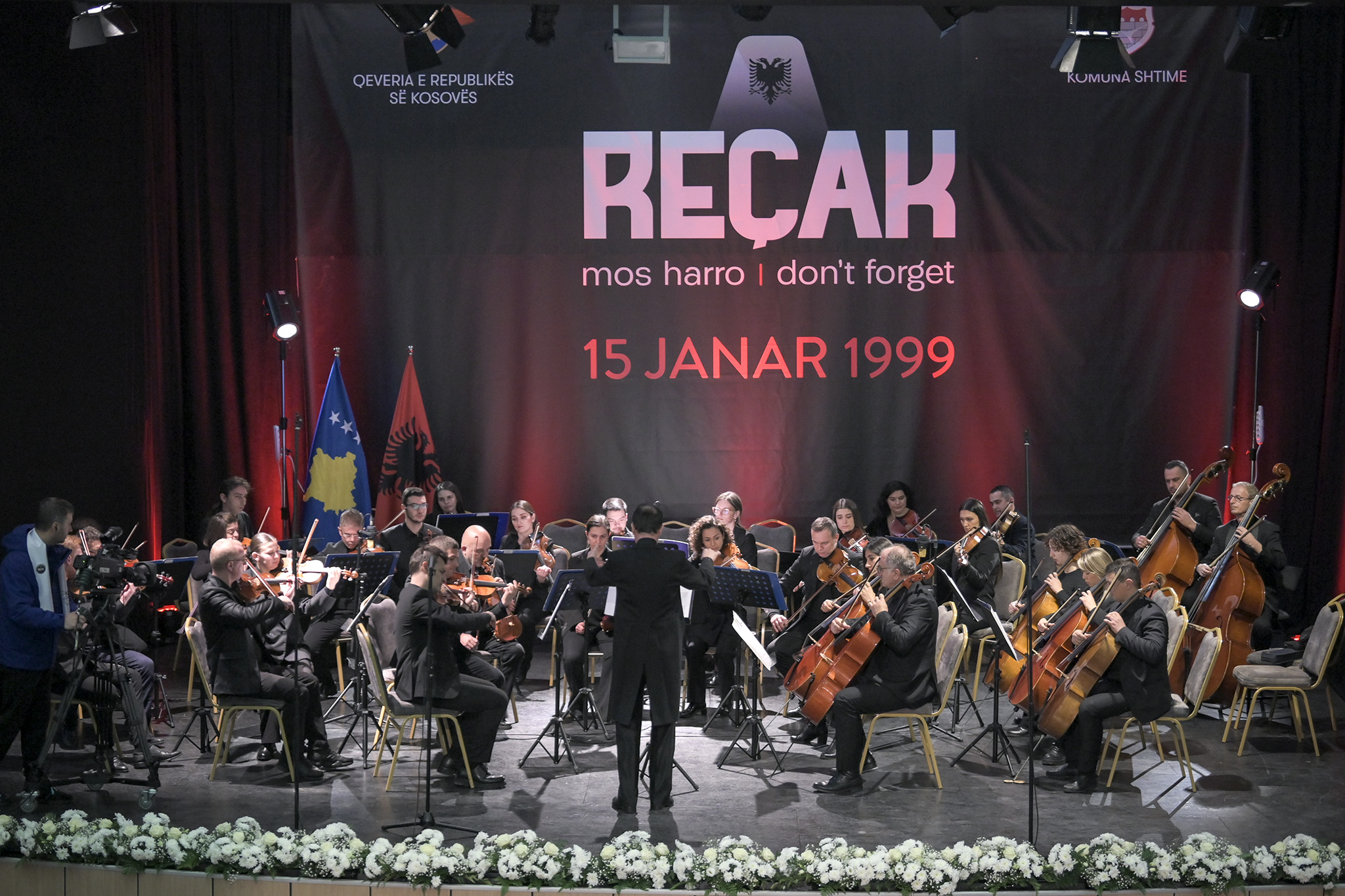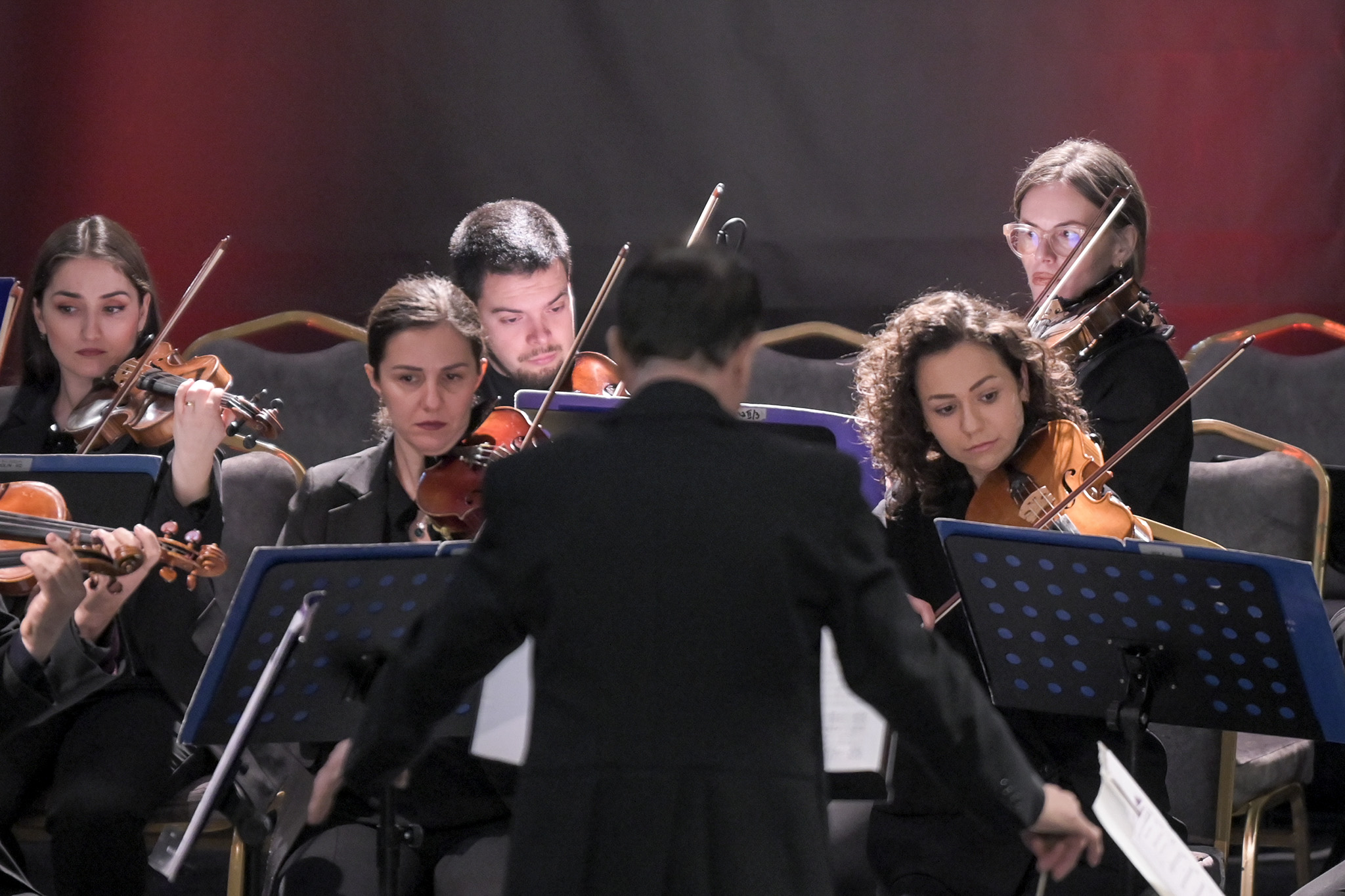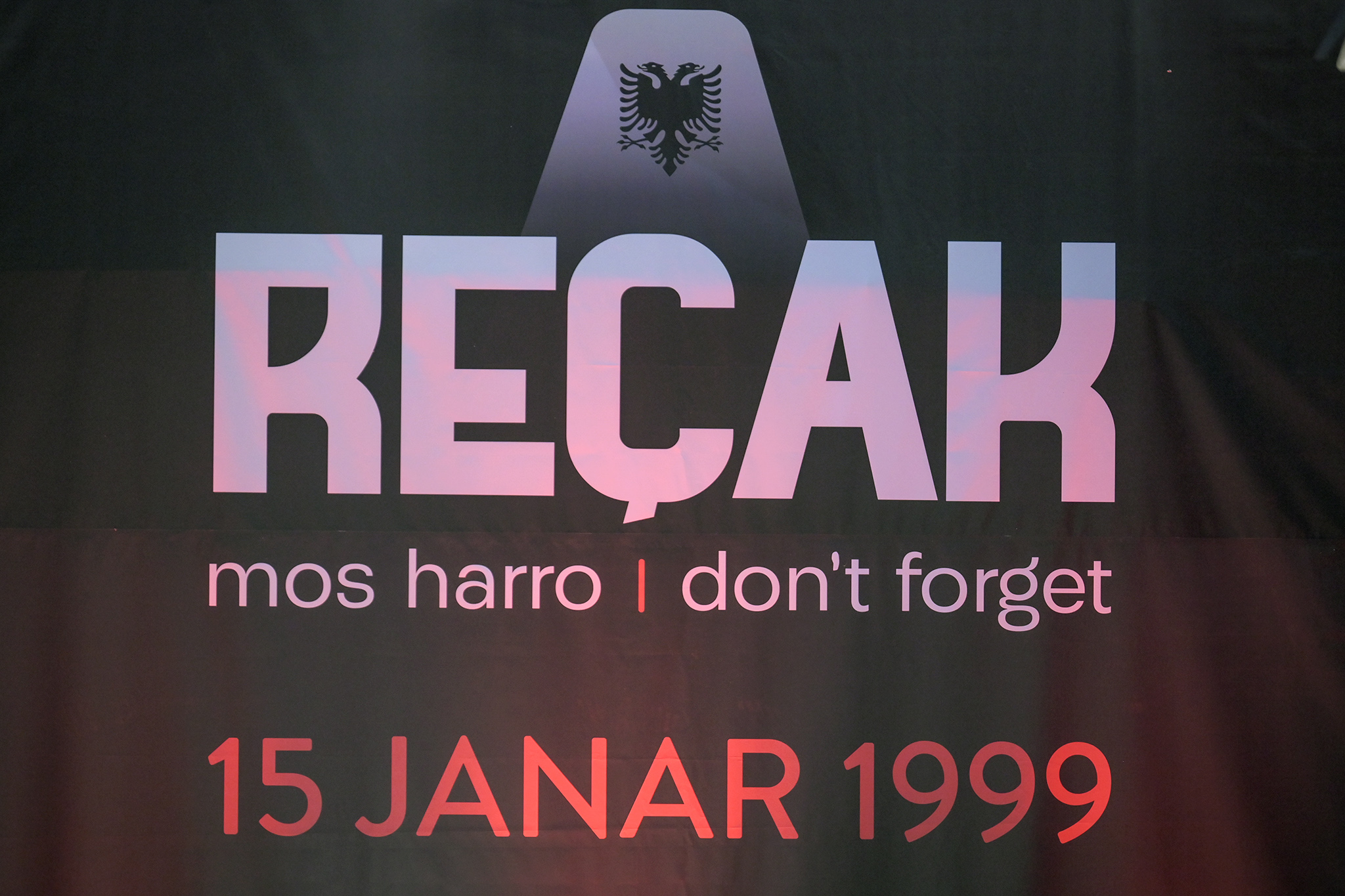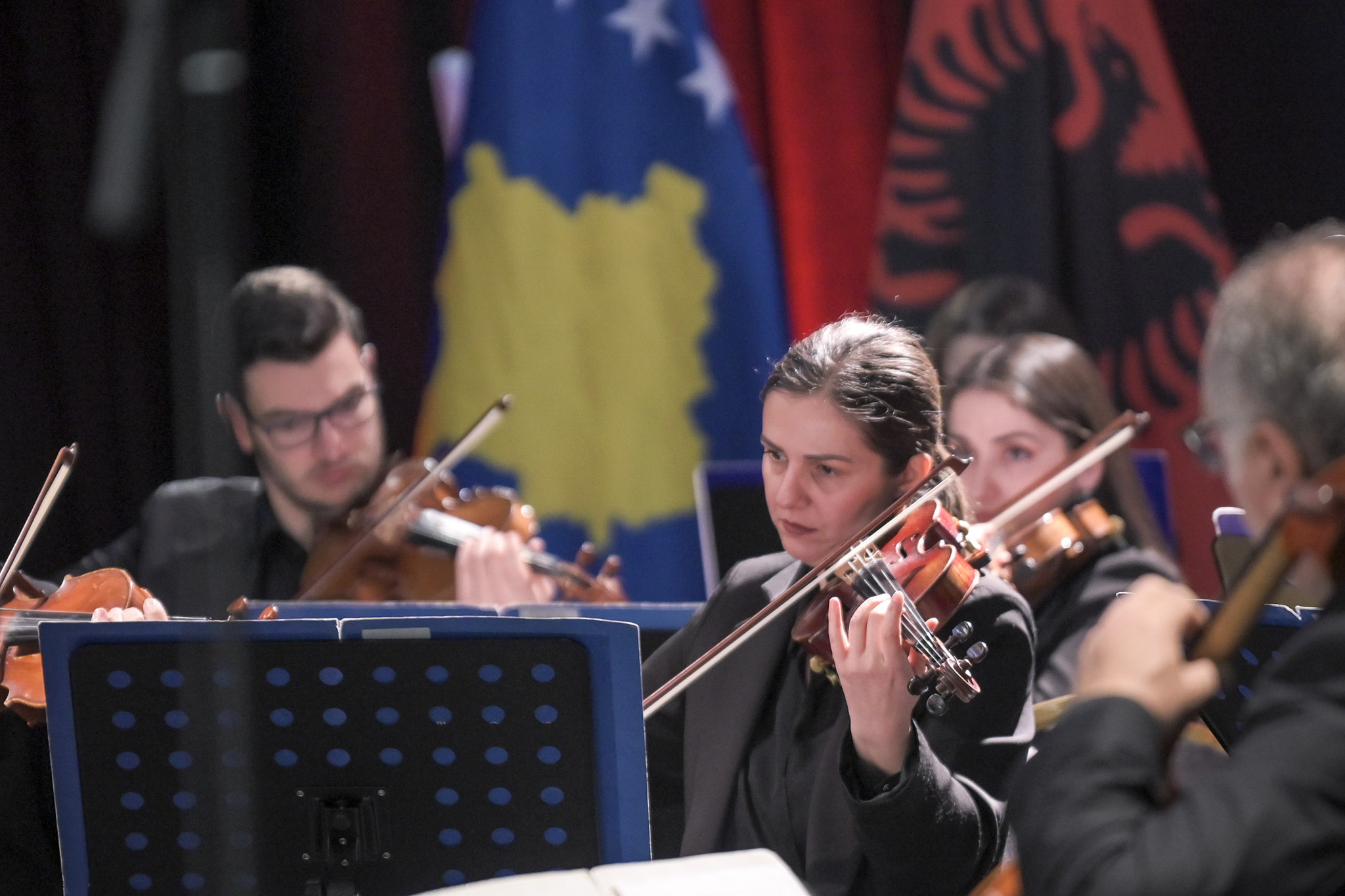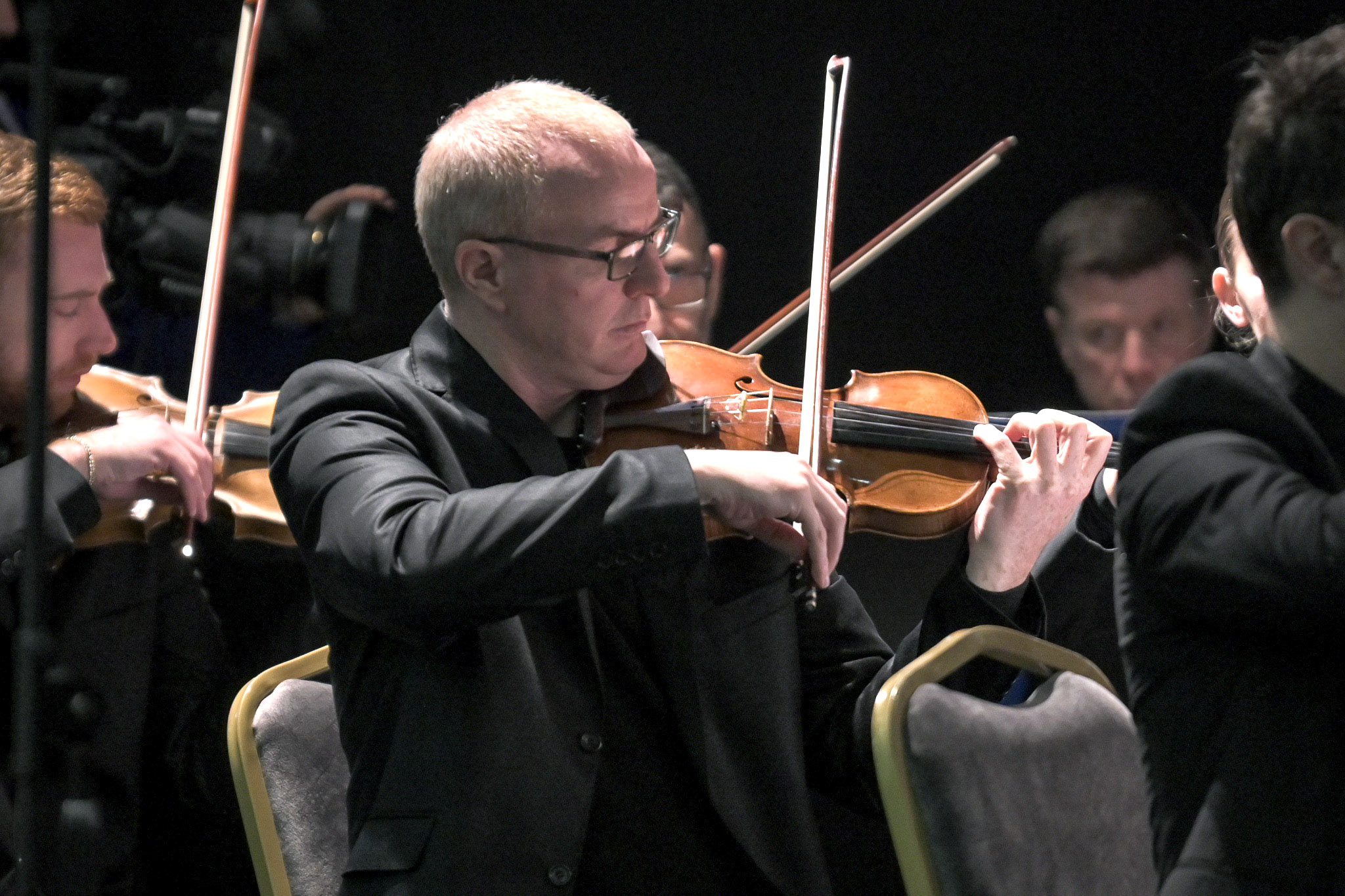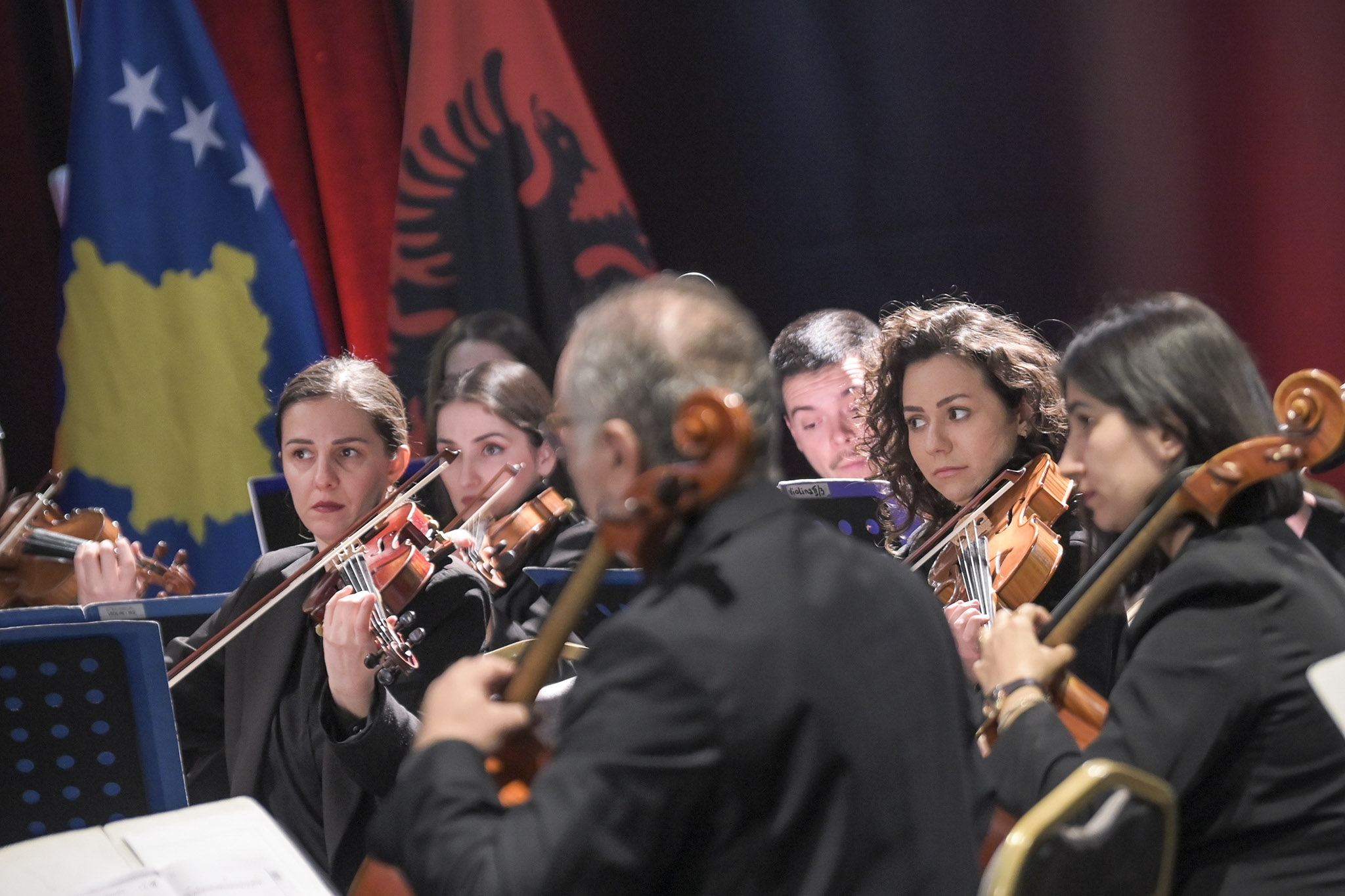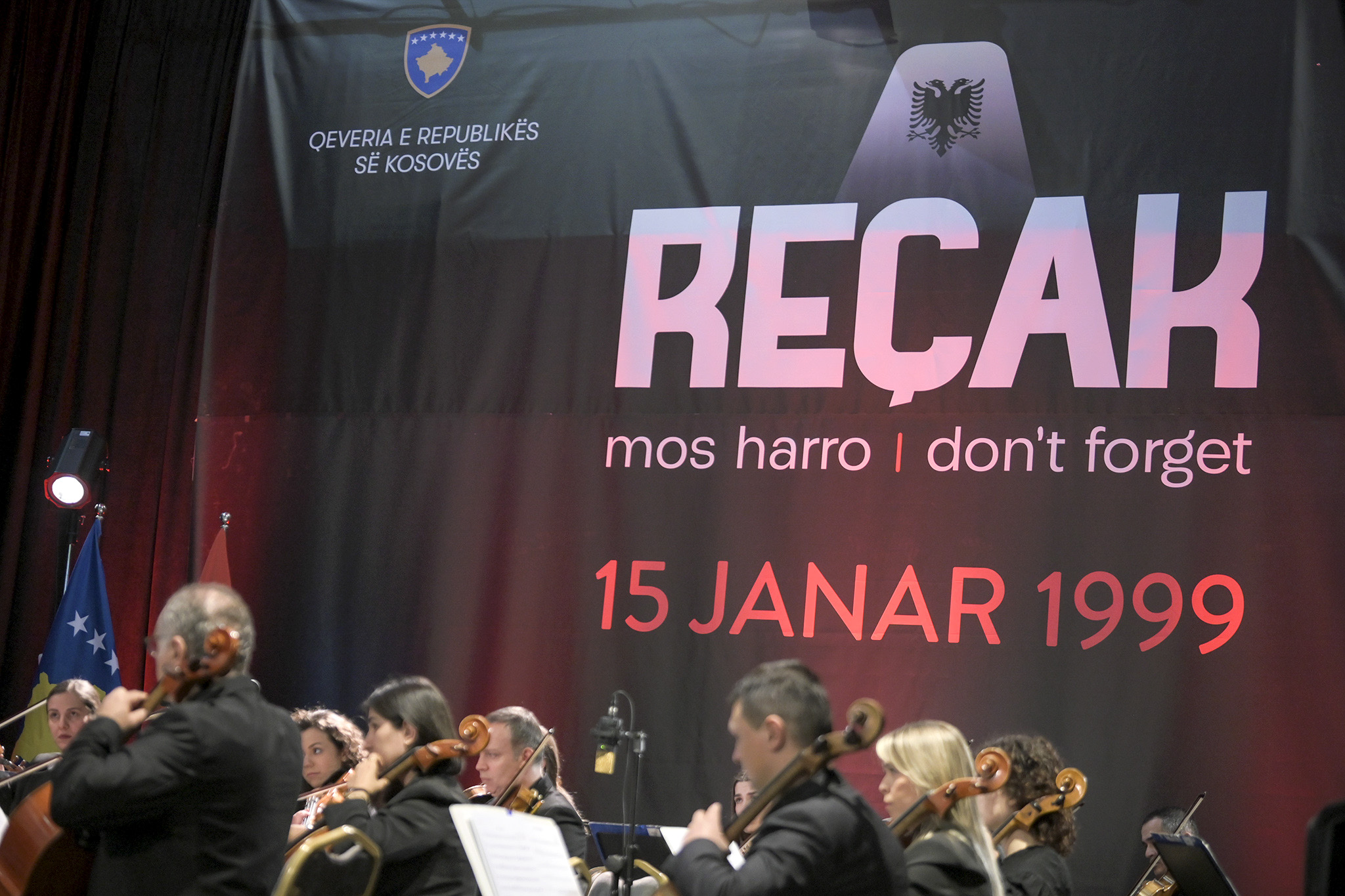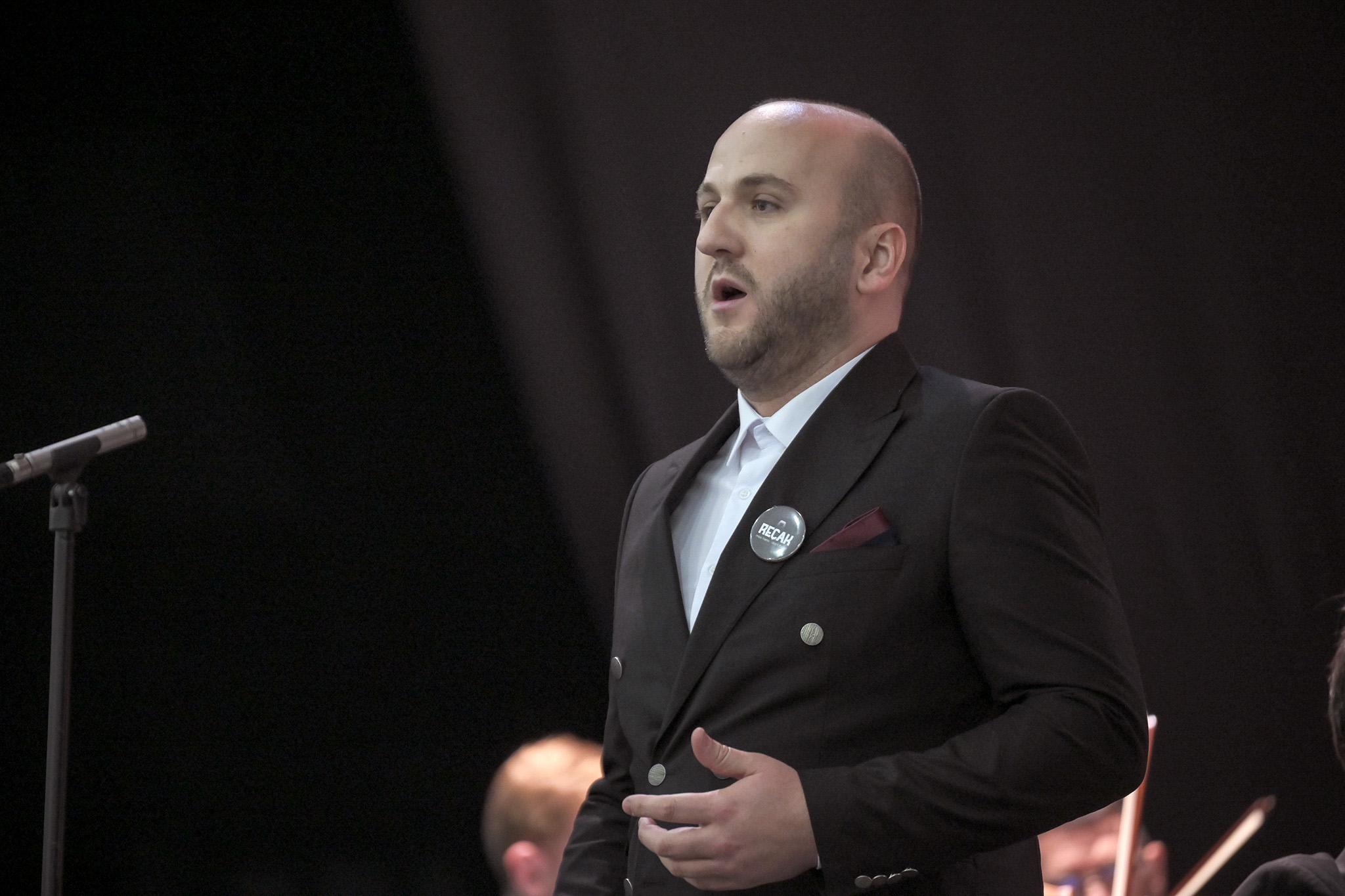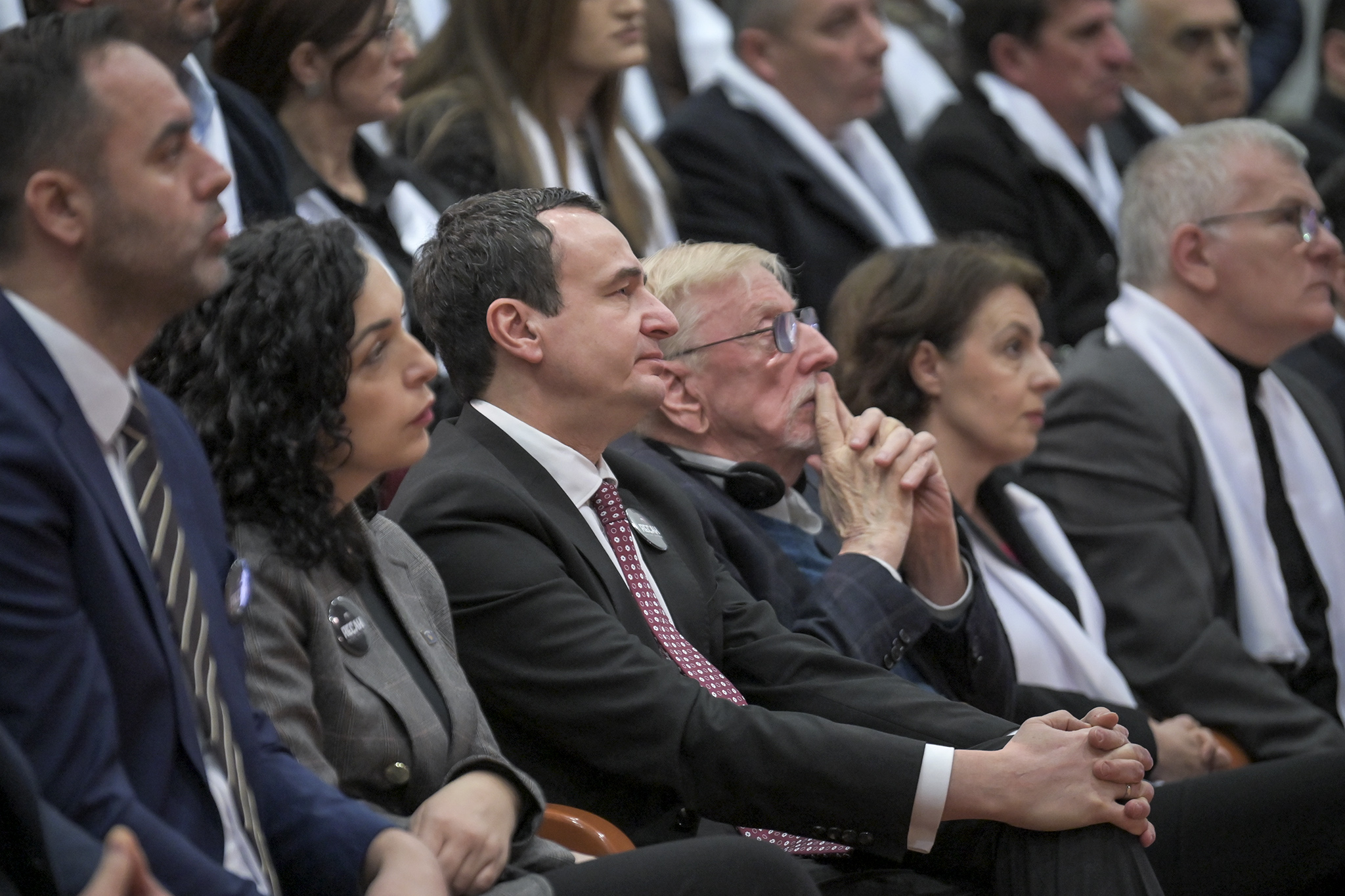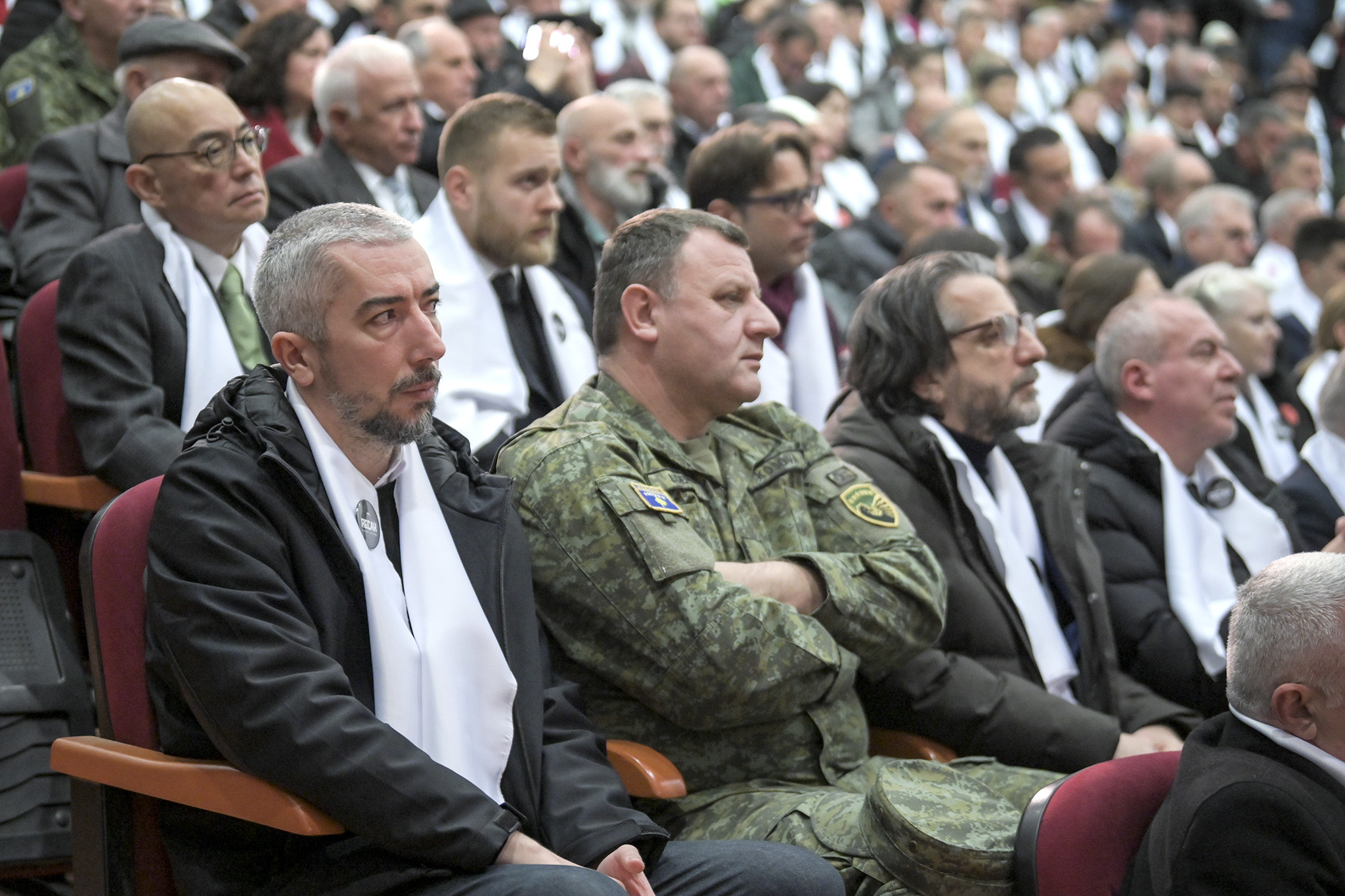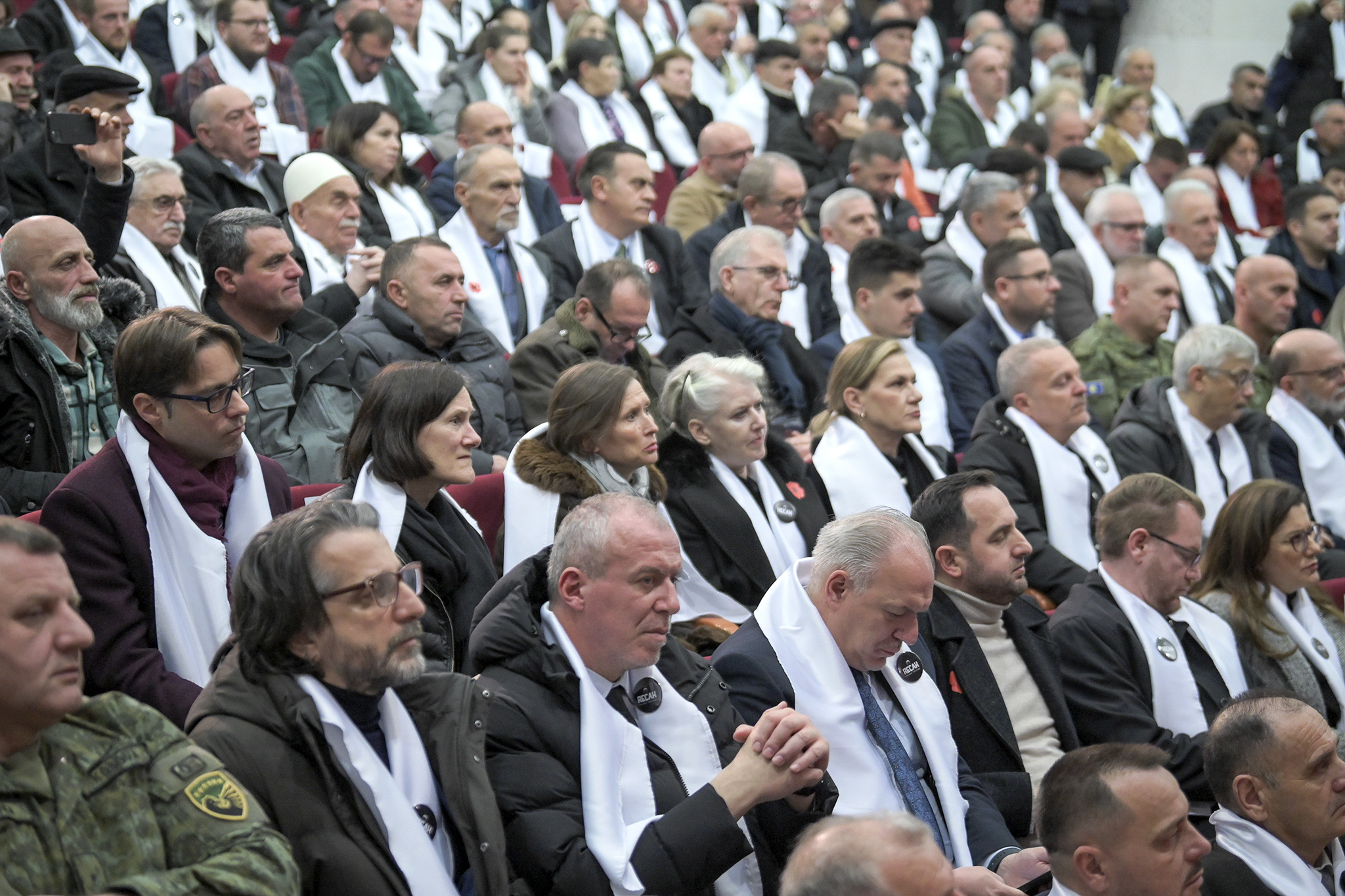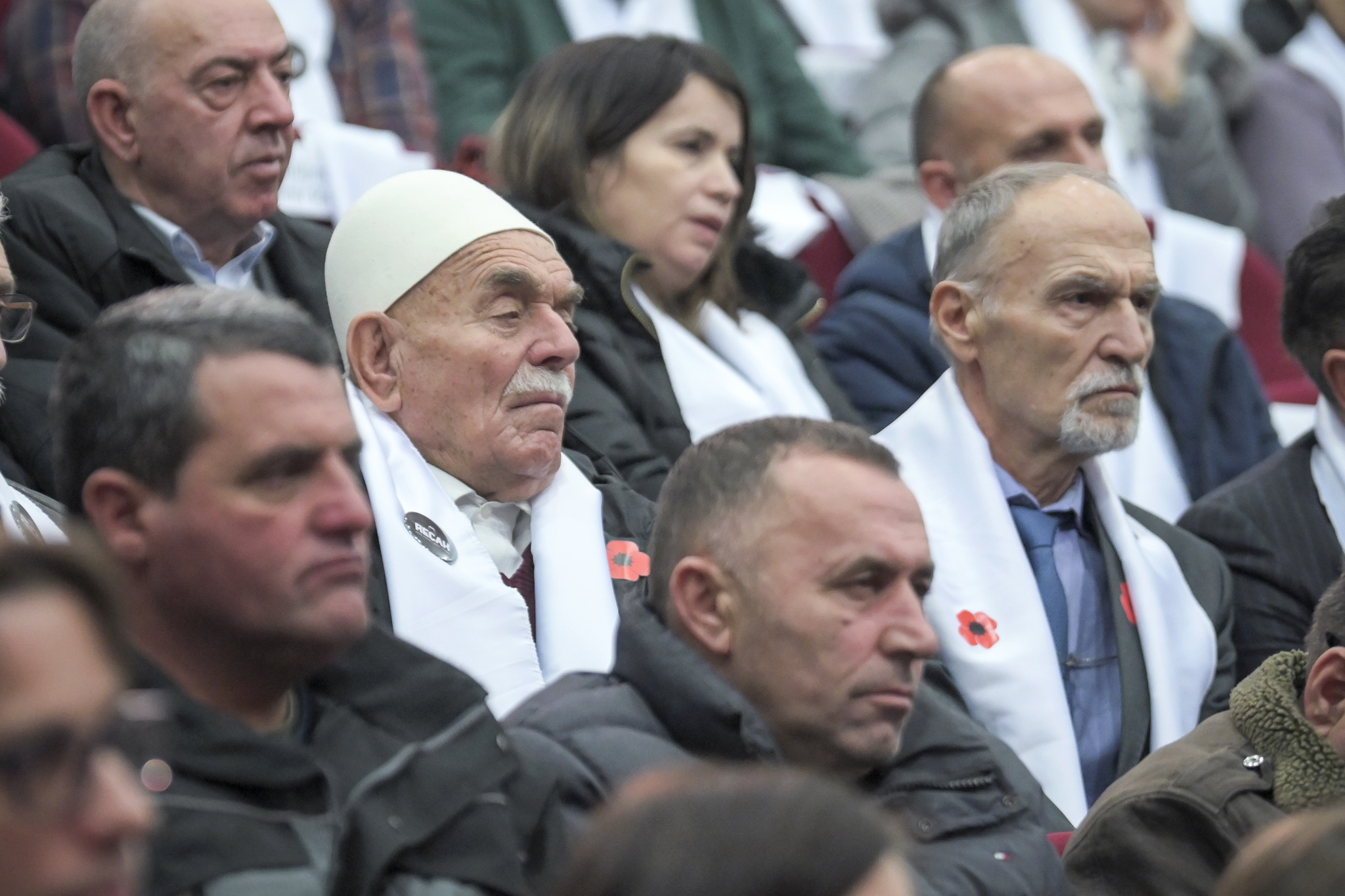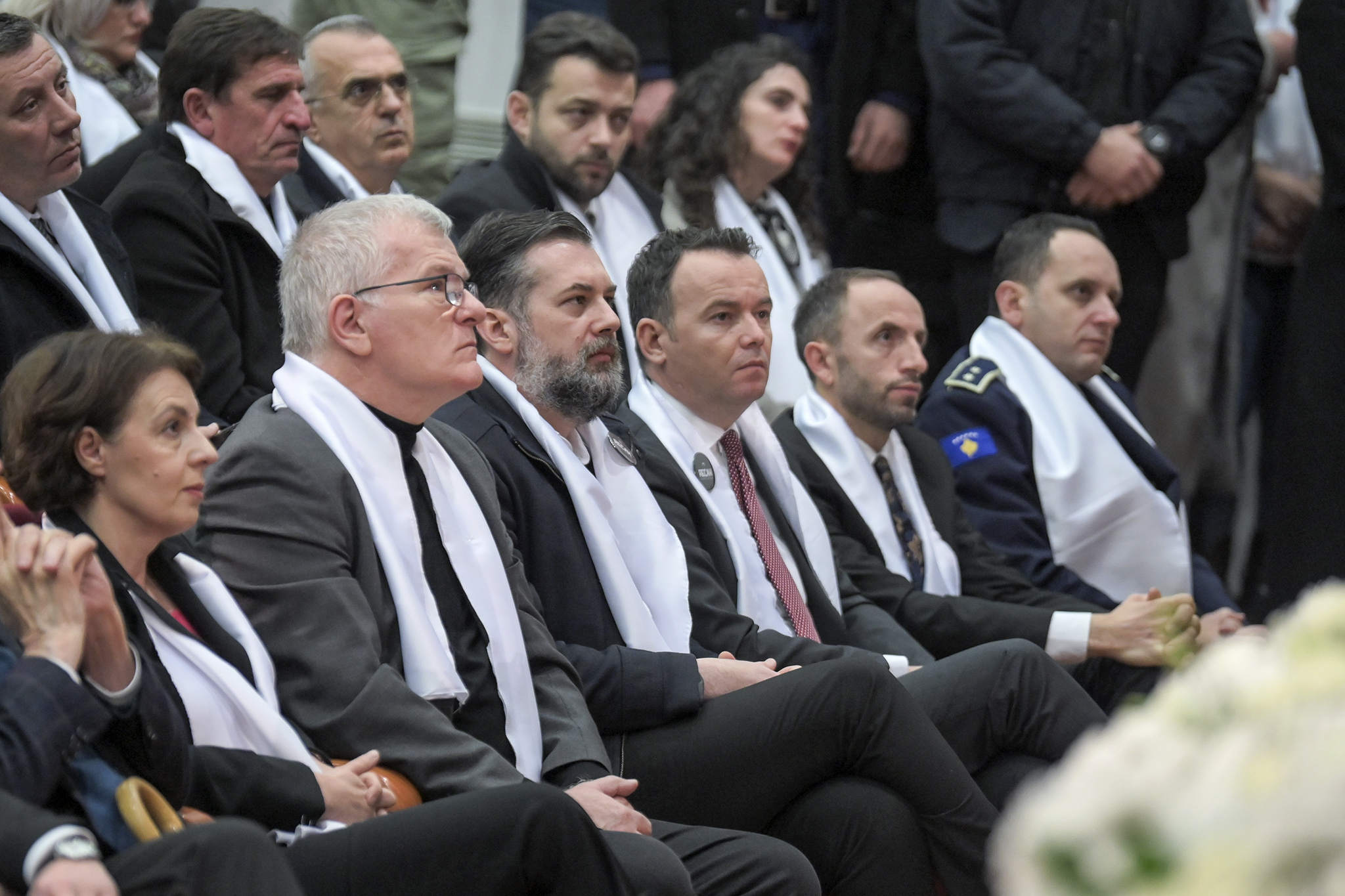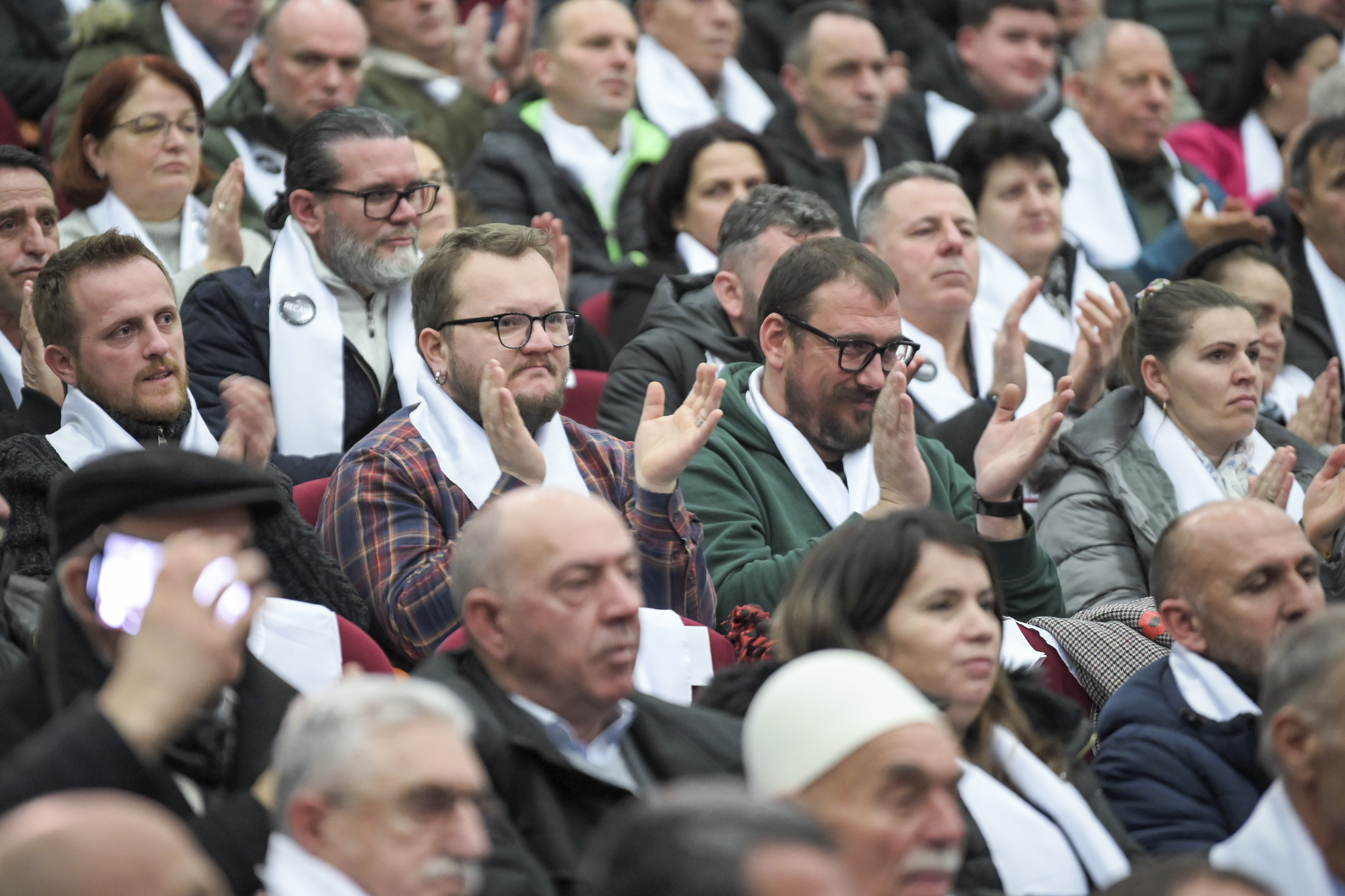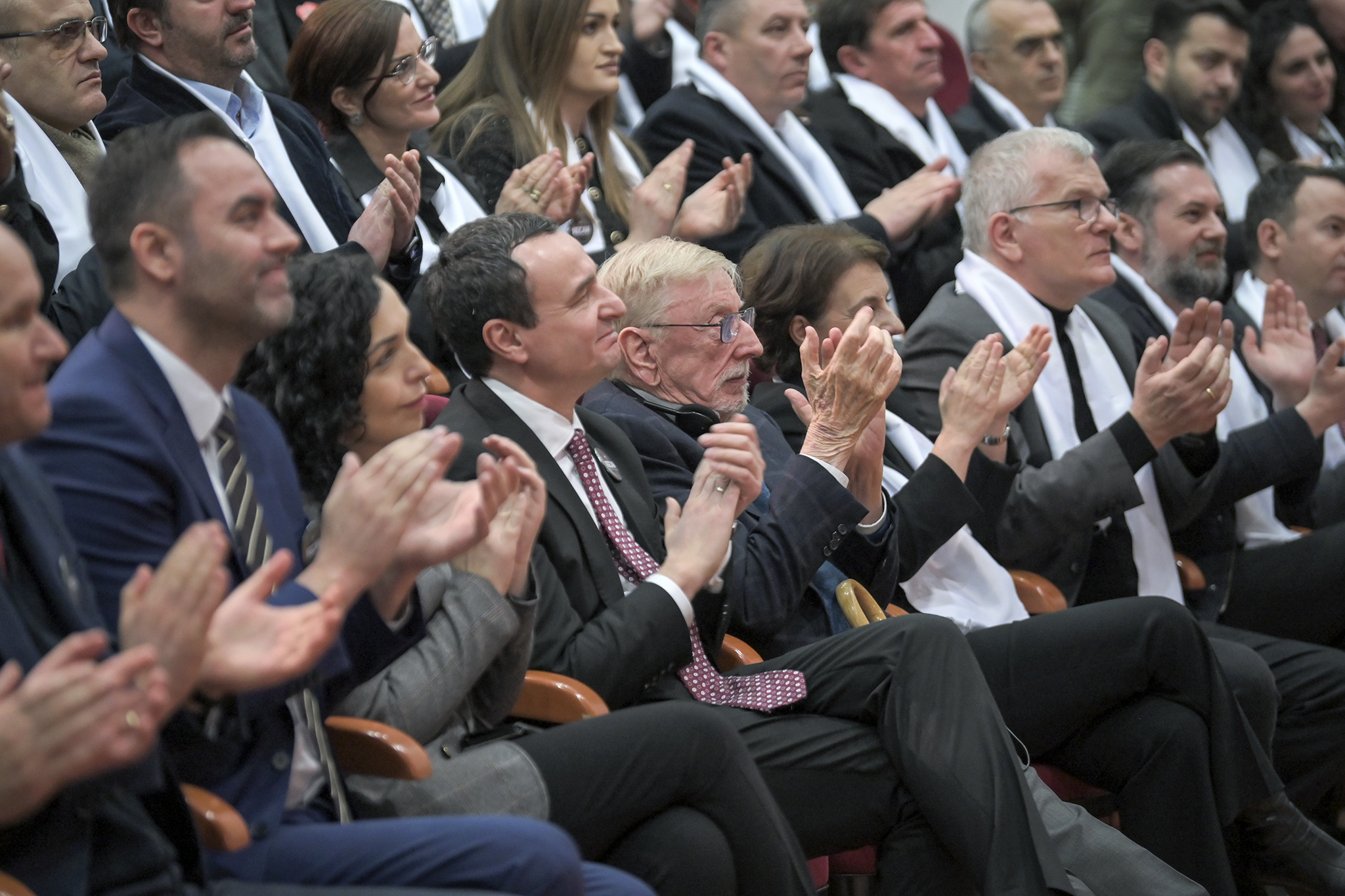Shtime, 15 January, 2024
After the tributes at the Reçak Memorial Complex as part of the 25th anniversary of the Reçak Massacre, a commemorative ceremony was held at the House of Culture in Shtime, attended by the three heads of state, Ambassador William Walker, the Mayor of Shtime, Qemajl Aliu and many other diplomatic representatives and local institutions.
“In the chronology of the history of massacres carried out by Serbia with its military, police and paramilitary forces on Albanians in our country, the Reçak massacre is the earliest in the calendar of 1999. That year, on a date like today, so on January 15, here in the village of Reçak of Shtime, Serbian police forces killed 45 Albanian civilians, among whom the youngest was 14-year-old Halim Beqiri, and the oldest was 99-year-old Avdyl Sejdiu. Their ages, as the borderline age among those killed in this massacre, indicate the victims and the nature of this crime committed during the war,” Prime Minister Kurti said at the beginning of his speech at the memorial ceremony.
Although 25 years ago Serbia activated its entire state apparatus to obscure and deny the massacre of Reçak, to hide the crime and to protect the perpetrators and those who ordered it, this massacre has had and has left behind witnesses and witnesses who testify the whole truth from the beginning to the end: from the first shot to the attempt to hide and justify the crime, from the body of Banush Kameri with his head cut off and to the massacred and mutilated corpses on Bebushi Hill.
Among the witnesses, he mentioned the surviving inhabitants of Reçak and other villages of Shtime, the KLA soldiers of the Operative Zone of Nerodime, the OSCE Verification Mission in Kosovo and the Head of this mission, William Walker, who called this massacre ” crime against humanity”, local and international journalists and photojournalists, the Finnish forensics team that performed the autopsies of 45 corpses, doctor Vezir Bajrami who was a doctor in the war and the KLA soldier, Arlind Guraziu, who lived traumatized by the images of corpses until he died in 2014.
He said that the people of Kosovo and the Republic of Kosovo do not forgive the crimes committed by Serbia during the war, not even in Reçak, nor anywhere else. Recalling that a year ago, the Special Prosecutor’s Office of Kosovo issued international arrest warrants for 18 Serbian suspects suspected of participating in the Reçak Massacre, he emphasized that these crimes never become obsolete, as they cannot be erased from the history of to the state of Serbia that committed these crimes and from the history of Kosovo and its people that experienced them with so much pain and inherited them with so much loss and suffering.
Recently, on January 12, 2024, the Prime Minister emphasized that the Government of Kosovo has decided to establish the Working Group for the Drafting of the Design Task of the Project for the “Reçak Massacre” Memorial Complex in Reçak of Shtime, to strengthen and monumentalize the memory and heritage for the massacre of Reçak. The members of this working group from different institutional positions will have the task of drafting a design task for the project for the “Reçak Massacre” Memorial Complex, so that in Reçak there is a dignified complex for the memory of the Massacre.
“May the memory of those killed in the Reçak Massacre be eternal in time!” Prime Minister Kurti concluded his speech at the commemorative ceremony on the 25th anniversary of the Reçak Massacre.
Prime Minister Kurti’s complete speech:
Dear President of the Republic of Kosovo, Mrs. Vjosa Osmani Sadriu,
The Honorable Speaker of the Assembly of the Republic of Kosovo, Mr. Glauk Konjufca,
Dear and Dear Ambassador William Walker,
Dear family members of those killed in the Reçak massacre,
Dear Ramë, survivor of the Reçak Massacre,
Dear Deputy Prime Minister, Mrs. Donika Gërvalla Schwarz,
Dear government cabinet ministers, deputy ministers,
Members of the Assembly of the Republic, representatives and leaders of Kosovo institutions, mayors of municipalities,
The honorable mayor of the Municipality of Shtime, Mr. Qemajl Aliu,
Excellences ambassadors and other diplomatic representatives of partner and friendly countries in our Republic,
Dear attendees,
Ladies and gentleman,
Sisters and brothers,
This year in 2024, in the middle of this year that we have just entered, it will be a quarter of a century since the end of the war of 1998-99, when we will mark the 25th anniversary of the liberation of Kosovo. Since Kosovo was invaded by Serbia in 1912, the country and its people have been held against their will under Serbia, until June 1999 when it was liberated. Therefore, as the 25th year after the war, the year 2024, namely the first half of this year, will be marked by the anniversaries of the massacres committed by Serbia on the Albanians in Kosovo, as well as commemorations of the martyrs of freedom and the battles of Kosovo Liberation Army.
In the chronology of the history of the massacres carried out by Serbia with its military, police and paramilitary forces on Albanians in our country, the Reçak massacre is the earliest in the calendar of 1999. That year, on a date like today, so on January 15, here in the village of Recak in Shtime, the police forces of Serbia killed 45 Albanian civilians, among whom the youngest was Halim Beqiri, 14 years old, and the oldest, Avdyl Sejdiu, 99 years old. Their ages, as the borderline age among those killed in this massacre, indicate the victims and the nature of this crime committed during the war.
25 years ago, Serbia activated its entire state apparatus, from the army to forensic medicine and from the media to state propaganda, to obscure and deny the massacre of Recak, to hide the crime and to protect the perpetrators and those who gave orders. And it is known who the Minister of Information in the Government of Serbia was: Aleksandar Vuçiq. Then from the position of Minister of Information and today from that of the President of Serbia, this man has continuously denied this crime against humanity, committed by the state of Serbia.
But the massacre of Reçak has had and has left behind testimonies and witnesses, who testify the whole truth from the beginning to the end: from the first shot to the attempt to hide and justify the crime, from the body of Banush Kameri with his head cut off and to the massacred and mutilated corpses on Bebushi Hill.
The Reçak massacre was witnessed by the residents of Reçak and other villages of Shtime who were saved alive, as they saw with their own eyes the crimes against their family members and neighbors.
The massacre of Reçak was witnessed by the KLA soldiers of the Operative Zone of Nerodime who even with their lives protected the civilian population and the corpses of those killed, from January 15 when they were killed until February 11 when they were buried.
The Reçak massacre was witnessed by the OSCE Verification Mission in Kosovo and by the Head of this mission, Ambassador William Walker, who at that time declared that what he had seen in Reçak was a “crime against humanity”.
The Reçak massacre is witnessed by many photographs and videos taken by local and international journalists and photojournalists, such as: Alban Bujari, Hazir Reka, Visar Kryeziu, Elida Ramadani, Sylejman Kllokoqi, Shaban Buza, Jeffrey Smith, Tom Walker, Melissa Eddy, Philippa Fletcher, Paul Watson and others.
The massacre of Reçak is witnessed by the Finnish forensic team that performed the autopsy on 45 corpses, namely by the report of this team and by its leader, Dr. Helena Ranta, who testified in the trial against Slobodan Milosevic at the International Criminal Tribunal for the former Yugoslavia in The Hague.
The massacre of Reçak is witnessed by the families of those killed, the residents of Reçak who saw and experienced the whole tragedy, some of whom have testified about this in The Hague Court as well.
The massacre of Recak was witnessed by Doctor Vezir Bajrami, a doctor in the war, who died in 2006.
The Reçak massacre was witnessed by the Kosovo Liberation Army soldier, Arlind Guraziu, who lived traumatized by the sight of the corpses until he died in 2014.
The Reçak massacre was witnessed by all these sources and people, some of whom are still here in Reçak today.
The massacre of Reçak is proven as a crime against humanity before the world and before history.
In order to reinforce and monumentalize the memory and legacy of the Reçak massacre, on January 12 this year, i.e. 2024, the Government of Kosovo has decided to establish the Working Group for the Drafting of the Design Task of the Project for the “Reçak Massacre” Memorial Complex in Reçak of Shtime. The 11 members of this working group from different institutional positions will have the task of drawing up a design task for the project for the “Reçak Massacre” Memorial Complex, so that in Reçak there is a dignified complex for the memory of the Massacre.
Dear attendees,
The time period from the war in Kosovo to this year is stretching and becoming 25 years, or a quarter of a century. This is a period that fills the time gap seen as necessary for clearer views and deeper reflections on the history of the war in Kosovo. We need to know from the context with all the circumstances and down to the smallest details, everything that happened during the war in Kosovo, for every day: from February 1998 and even earlier from 1997 as a prelude to the war until June of 1999, when NATO troops entered Kosovo, and Serbian forces fled from Kosovo.
The people of Kosovo and the Republic of Kosovo do not forgive the crimes committed by Serbia during the war, neither in Reçak nor anywhere else. A year ago, the Special Prosecutor’s Office of Kosovo issued international arrest warrants for 18 Serbian suspects, who are suspected of participating in the Reçak Massacre. The crimes committed during the war never get old, just as they cannot be erased from the history of the state of Serbia that committed these crimes and from the history of Kosovo and its people that experienced them with so much pain and inherited them with so much loss and suffering.
May the memory of those killed in the Reçak Massacre be eternal for all time!
Thank you!
Last modified: January 16, 2024
